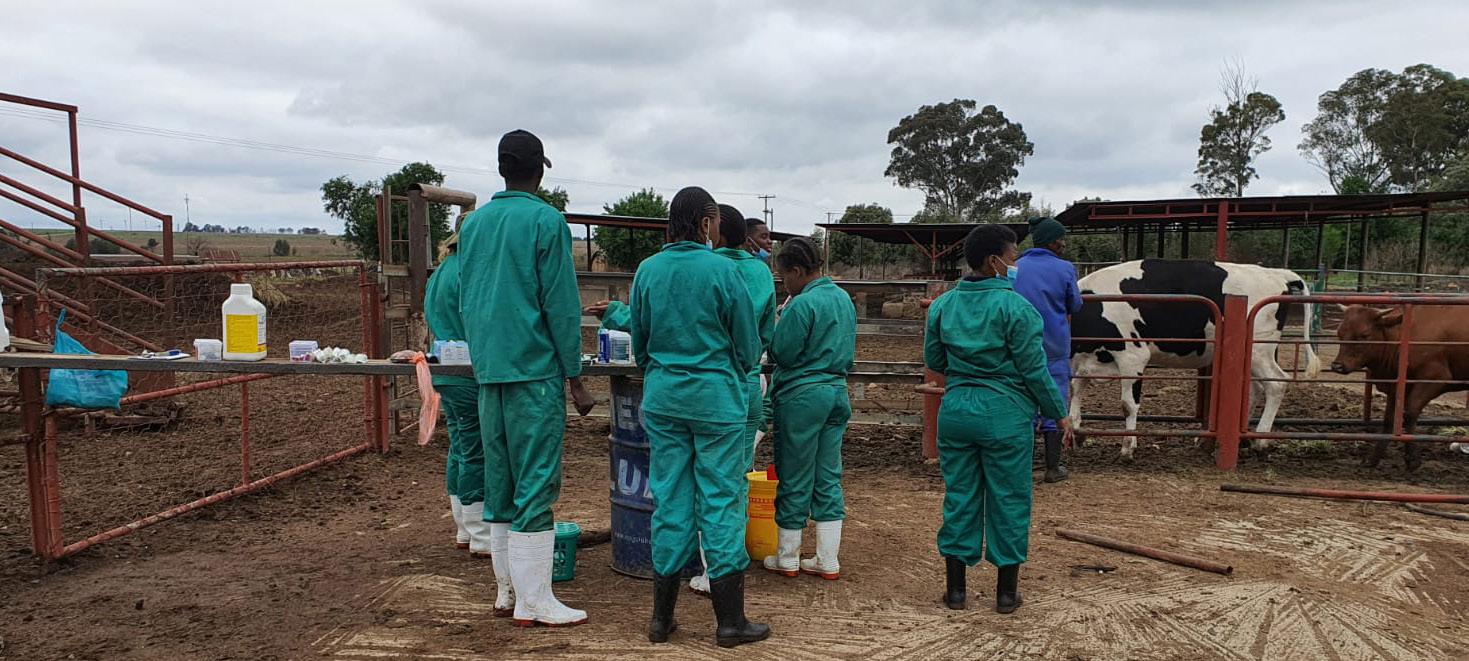
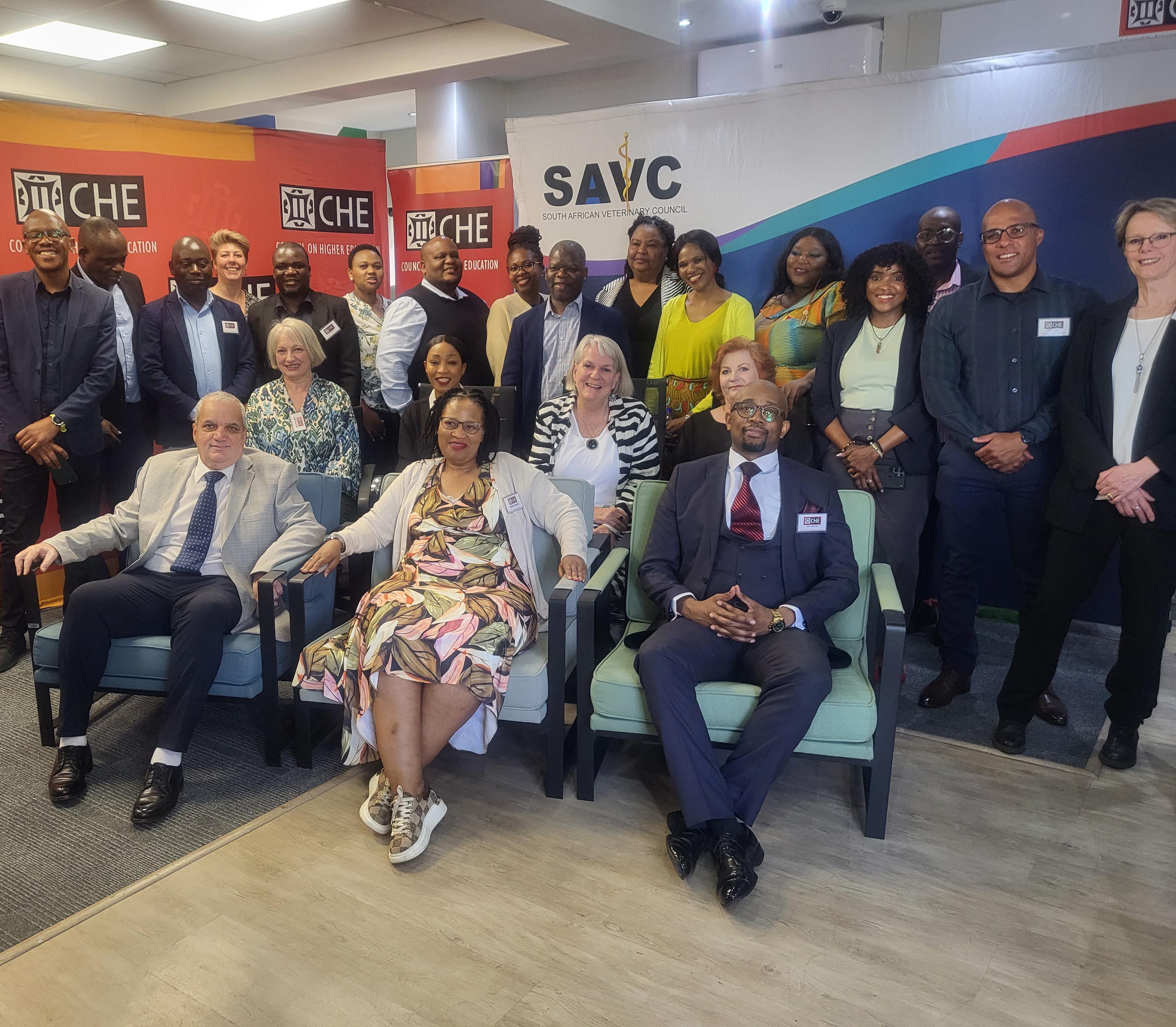



the Council on Higher Education (CHE) and the SAVC President and management attend the signing of the memorandum of agreement at the CHE offices on 22 August 2024.
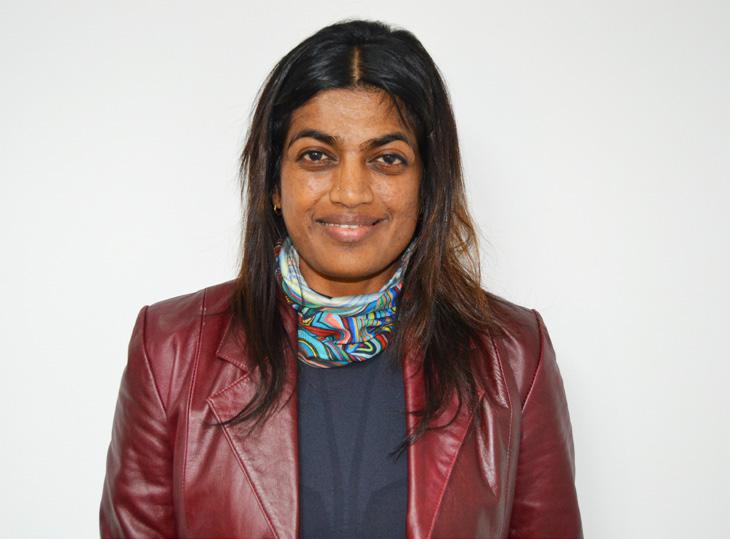

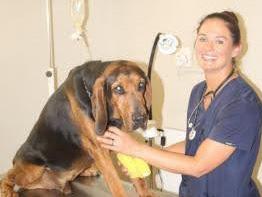
President’s message
Registrar’s mid-term operational update
Interim election for a veterinarian/specialist for the Council’s remaining term of office (2022 to 2025)
A step forward for the professions as 10 LATs write registration exam
Farewell to Dr Thireshni Chetty, a hero of the veterinary profession
Notice of transgression
Striving towards wellness
SAPS honours outstanding veterinary nurse
Profession days and special days to celebrate
Vaccinated pets save lives: #BreakingBoundaries on World Rabies Day
Celebrating our hard-working AHTs on their special day
Three cheers for our amazing veterinary nurses
Catch up with our latest webinars
Follow the SAVC on social media
In memoriam
Contact us
Struggling with stress and anxiety? Speak to the SAVC’s Wellness Committee
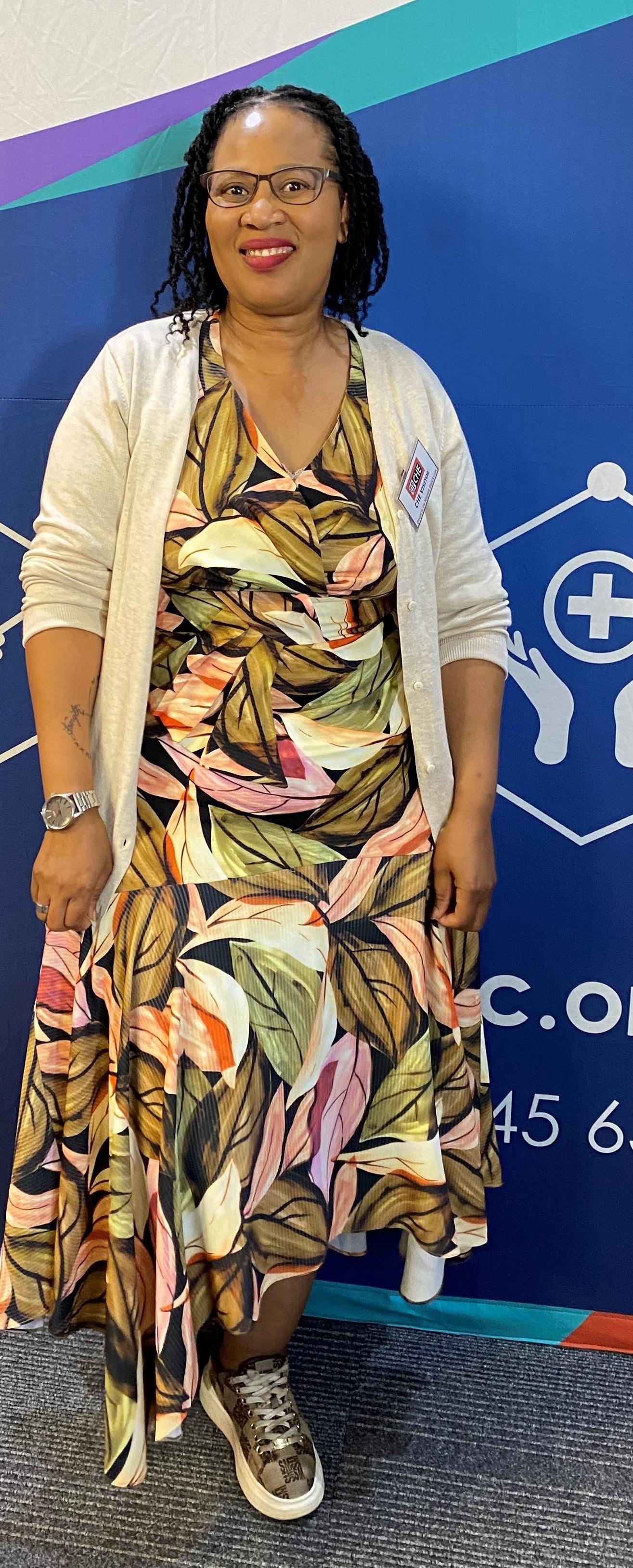
It is my great pleasure to welcome you to this edition of The Council’s Voice. Reflecting on the past year, we are reminded of the significant milestones and challenges that have shaped our journey to date.
One of the most pressing issues we face is the shortage of veterinarians in our country. This shortage underscores the urgent need for additional veterinary schools and faculties. Expanding our educational infrastructure is crucial to meet the growing demand for veterinary services and maintain the highest standards of animal care.
In this regard, the SAVC congratulates the University of the Free State on its recent announcement that it will open a new faculty of veterinary science, expected to be operational in 2027. As the custodian of quality veterinary and paraveterinary standards in South Africa, the SAVC will work with the university to ensure that the minimum standards of this qualification are met.
I am proud to highlight that the current Council has now commenced with the final year of its three year term. As we continue to build on our achievements, we remain committed to addressing the challenges that lie ahead. We recently concluded an interim election to fill a Council vacancy following a resignation (please refer to the article on this process elsewhere in this newsletter). We welcome Dr Jana Pretorius, who has been elected to Council for the remainder of the 2022-2025 term. We are confident that her contributions will further strengthen our team.
The annual SAVC registration examinations started at the beginning of October. These examinations are a critical component of our efforts to uphold the professional standards of veterinary and para-veterinary practice in South Africa.
We are also pleased to welcome recently appointed Minister of Agriculture John Steenhuisen into our fold. Although this welcome is somewhat belated, as he has been with us for the past few months, we are optimistic about the fruitful engagements and collaborations that lie ahead. Together, we can work towards a more robust and effective veterinary and para-veterinary sector. The most critical areas we will be bringing to his attention are:
1. Policy development: we look forward to working together to develop and implement inclusive policies that support the veterinary sector, including regulations that ensure the welfare of animals and the safety of veterinary practices. This forms part of the SAVC’s transformation agenda
2. Educational initiatives: we plan to collaborate on initiatives to expand and enhance veterinary education, such as establishing new veterinary schools and faculties, and improving existing programmes
3. Funding and resources: we will lobby to secure funding and resources to support veterinary services, research and education, ensuring that the sector has the necessary tools to thrive, including addressing issues of mental well-being and health
4. Community outreach: we will strengthen our engagements with communities to raise awareness about the importance of veterinary care and animal welfare, and to promote responsible pet ownership and livestock management
5. Biosecurity and veterinary workforce development: we will work to ensure the safety of South Africa’s animal herd and to prioritise the provision of veterinary services that can respond quickly to disease outbreaks
Another significant development is the signing of the memorandum of agreement between the SAVC and the Council on Higher Education. This agreement marks a pivotal step in our efforts to enhance veterinary and paraveterinary education and training, ensuring that our graduates are properly equipped to meet the demands of the professions.
As we celebrate our achievements, we must also take a moment to bid farewell to the veterinarians and paraveterinary professionals who have passed away in recent months. Their contributions to our field were invaluable, and they will be deeply missed. We extend our heartfelt condolences to their families and loved ones.
In closing, I would like to thank each and every one of you for your unwavering support and dedication. Together, we can continue to advance the veterinary and para-veterinary professions, and make a positive impact on the lives of animals and people alike.
Warm regards,
Dr Nandipha Toyota Ndudane
President: SAVC

By Mongezi Menye, SAVC Registrar and CEO
It is a privilege and honour to share the mid-term review of the SAVC’s Annual Performance Plan (APP), as we aim to enhance our service offerings to our registrees and stakeholders. The implementation of the APP is aligned with both our three-year Strategic Plan and Service Charter.
We recently signed a memorandum of agreement (MoA) with the Council on Higher Education (CHE). The MoA establishes a framework for collaboration in the areas of qualification standards, quality assurance and the promotion of excellence in higher education. Also, it sets out a clear structure for cooperation between the CHE and SAVC, with the goals of:
• Enhancing the quality assurance system for higher education institutions offering professional veterinary and paraveterinary qualifications
• Clarifying the roles and responsibilities of both parties in ensuring that veterinary and para-veterinary qualifications meet national standards and align with the policy for recognising professional bodies
• Promoting a coordinated approach to quality assurance that benefits both the educational institutions and the professionals concerned
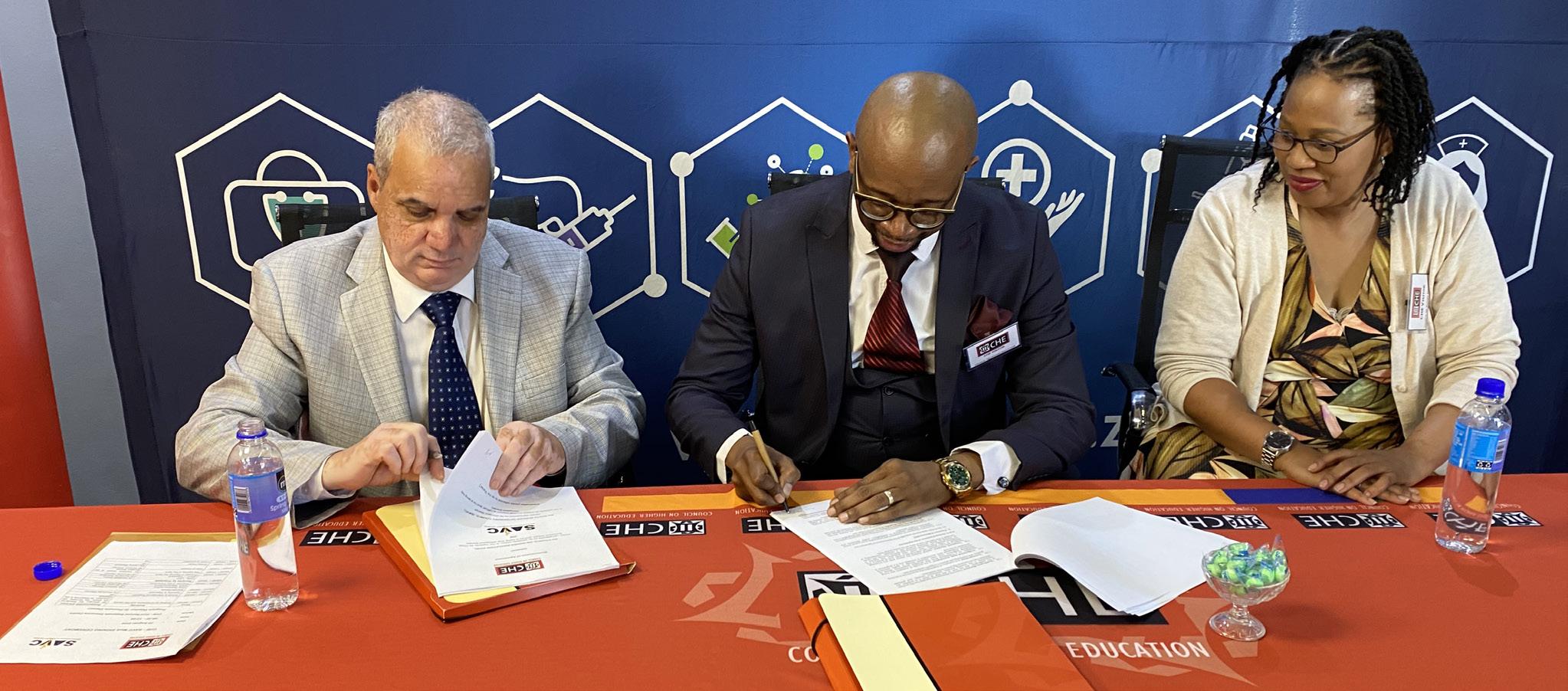
is a
• We have received a clean audit for the 2023/24 financial year
• The SAVC’s 2023/24 Annual Report was tabled in Parliament on 30 September 2024
• By the end of June 2024, we had collected 67% of the annual maintenance fees from our registrees
• An extension was granted until 15 August 2024 to allow registrees to make payment of the outstanding fees
• At the end of the extension period, we had received 80% of the annual maintenance fees from our registrees
• We would like to extend our sincere gratitude to all registrees who are paying their annual fees during these difficult economic times
• We also encourage all registrees to contact the SAVC office if they have challenges keeping up with their annual maintenance fees
• Second veterinary faculty
The University of the Free State has secured the right to open a new faculty of veterinary science. Dr Lindie von Maltitz, an agricultural economist at the university, recently announced this groundbreaking development at the Free State Agriculture Annual Congress in Bloemfontein.
The faculty is expected to become operational by 2027, providing essential veterinary education and services to the region.
�� Read more via Farmer’s Weekly
• Global accreditation
One of the aims of the International Accreditors Working Group (IAWG) is to align veterinary standards reviewed during international visitations. As part of global accreditation efforts, Dr Princess Moswa-Kato and Dr Nomsa Mnisi attended the online IAWG meeting hosted by South Africa on 24 and 25 July 2024.
Dr Johan Marais attended a visitation to the University of Pennsylvania from 3 to 7 December 2023 and Dr MoswaKato undertook one to the University of Cambridge from 26 to 31 May 2024.
In 2021, the SAVC, the Australasian Veterinary Boards Council and the Royal College of Veterinary Surgeons embarked on a combined visit to the University of Pretoria’s Faculty of Veterinary Science. A follow-up visit was conducted from 6 to 8 May 2024.
• Local visitations
As part of the SAVC’s mandate to monitor training standards, Council members undertook a visitation from 15 to 19 April 2024 to the Tshwane University of Technology related to the training of veterinary technologists.
Preparations for each visit commence a year beforehand. Therefore, notice has been given of planned visits to Unisa (21 to 25 July 2025) and North-West University (13 to 17 October 2025); both institutions are responsible for training animal health technicians. A visitation to the Tsolo Agriculture and Rural Development Institute will be scheduled for 2026.
• Animal health technician registration amnesty
Applications for the AHT registration amnesty closed on 14 July 2023. In total, 214 applications were received:
(were applying for special dispensation on maintenance
(do not have the relevant qualification)
• All applicants who qualified for automatic registration have been registered and are now active on the register
• 65 applicants have been authorised to work while waiting to sit the practical exams
• 51 applicants have not yet replied to the SAVC and will be removed from the AHT registration amnesty database
• Registration of para-veterinary facilities (work for own gain)
Following the promulgation of the new para-veterinary rules in December 2022, whereby South Africa’s paraveterinary professionals may work for their own gain within their scope of practice, the Council has received applications for, and registered, a number of para-veterinary facilities to date:
• Primary animal healthcare facilities (animal health technicians) – 19 facilities registered
• Veterinary nursing facilities – four facilities registered
• Veterinary physiotherapy facilities – 26 facilities registered
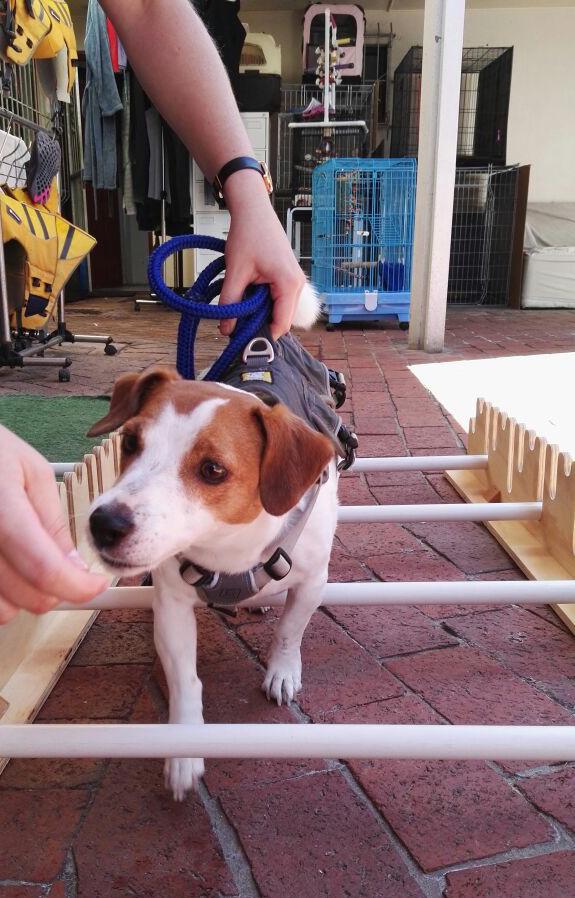
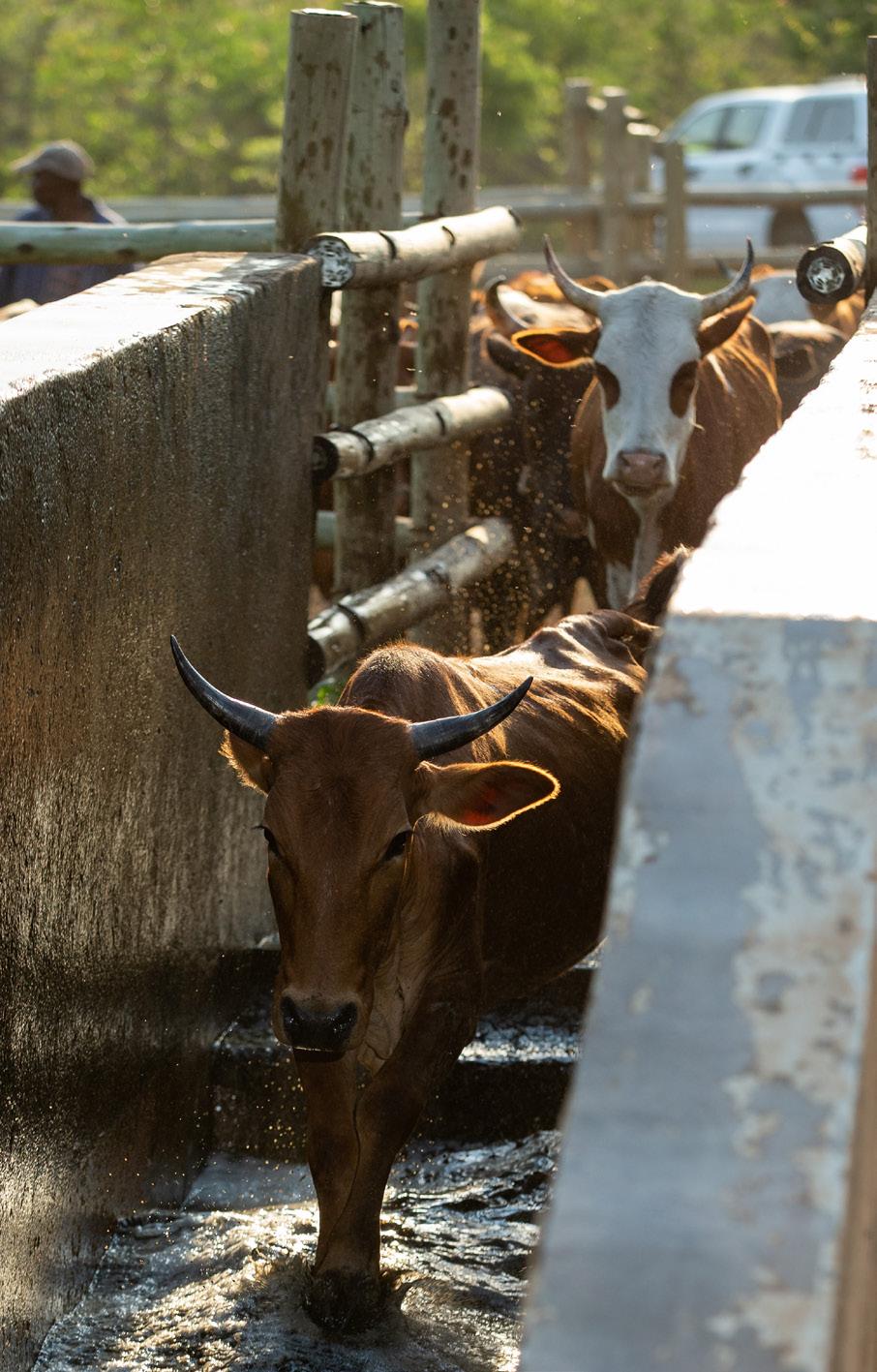
The SAVC’s online student registration application process has been in operation since March 2024. We are in the process of finalising the online application process for new registrations of qualified persons, and for currently registered students who have qualified and have to transition to their respective qualified member types, e.g. from CH to H, from CV to V, etc.
Soon, registrees will be able to submit their applications directly via their Registree Portal accounts. Therefore, it is crucial to have access to your account. If you experience any issues in this regard, please contact the relevant SAVC staff member for your profession for assistance.
In short, if you were registered with the SAVC as a student and have now qualified as a professional, in future you can log into your account, select the “Transition” tab, fill in the required information, upload the necessary documentation and proof of payment, and submit your application.
After your submission, you will receive a pop-up confirmation that the registration division has received your application. Please allow five to seven days for your application to be processed, verified and approved. Upon its approval, you will receive an email with information specific to your profession and your proof-ofregistration letter.
This process applies to both para-veterinary professionals and compulsory community service (CCS) veterinarians. Prospective CCS veterinarians also need to submit their letters of placement from the Department of Agriculture, Land Reform and Rural Development.
Once CCS veterinarians have completed their CCS year, the department will provide the SAVC with a list. After that, the SAVC will transition all CCS veterinarians’ registrations to D member-type registration numbers. A confirmation email will be sent to those veterinarians, including proof of their registration and instructions on how to obtain their certificates.
CCS veterinarians (CS) transitioning to veterinarians (D) will then enter the second year of their three-year CPD cycles.
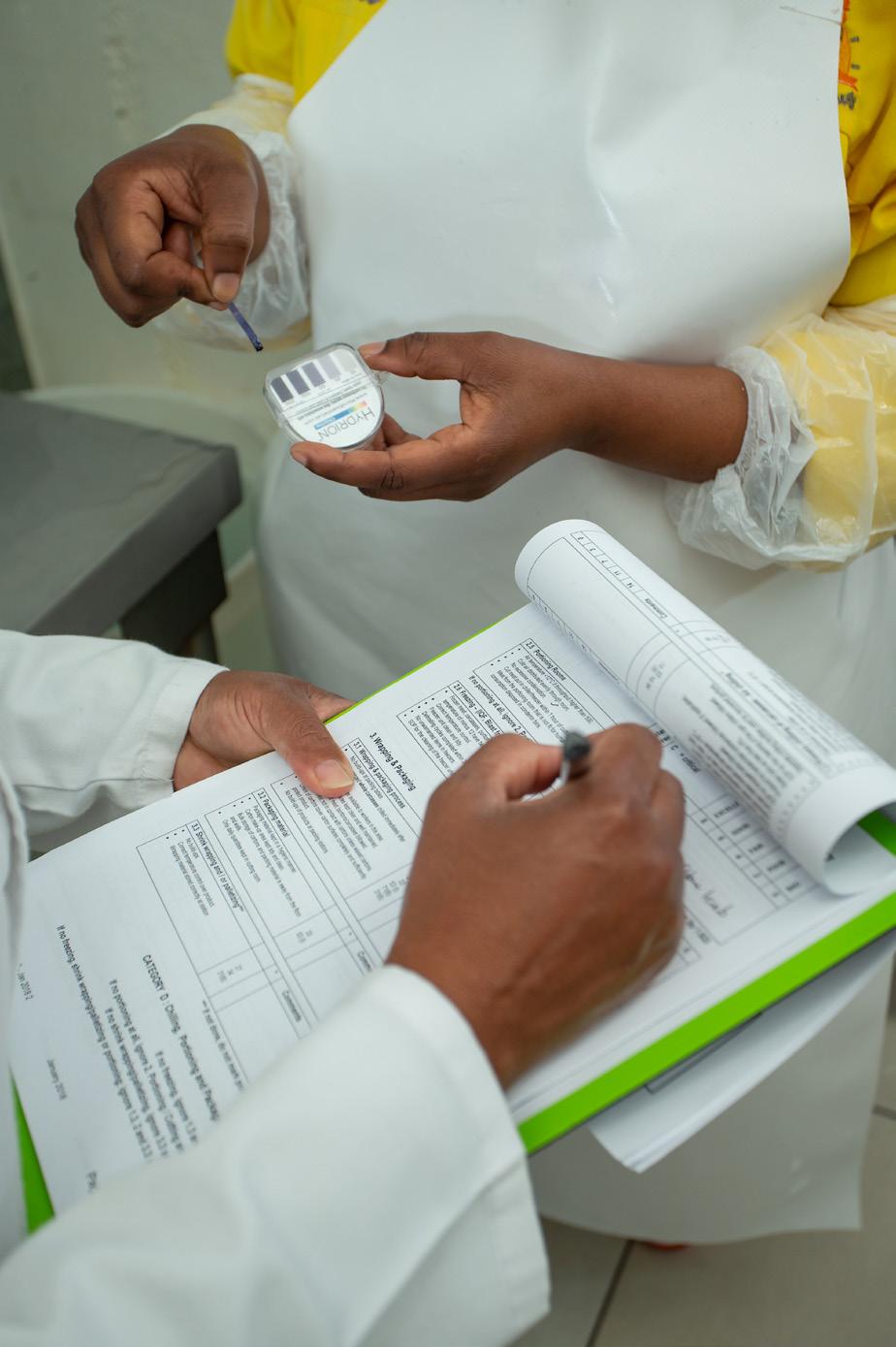
Submitting annual declarations has been discontinued and will be replaced with the issuing of annual proof-of-registration letters. Once registrees’ annual payments have been received and qualified registrees are up to date with their most recent closed CPD cycles, these letters will be automatically available to view and download via the Registree Portal.
This functionality forms part of the automation process that will be completed in 2025 as part of the Digital SAVC Project. Registrees will be notified as soon as this functionality becomes available.
Also, please note that registrees can now upload unstructured CPD points for the most recent closed cycle. Navigate to the “Previous cycles” table at the bottom of the CPD menu and select “Add unstructured points” under the “Action” column.

• Update on the SAVC’s legal compliance project
Here is a breakdown of the incidents reported via the ExposeIT app, as of 20 September 2024:
– Act 36/1947
(10 – SAPS; 4 – Investigation Committee; 5 – Investigating Body; 15 – closed due to no evidence)
The SAVC Executive Committee – comprising the President, Dr Nandipha Ndudane; the Vice-President, Dr Brendan Tindall; Council member Sphamandla Qwabe; and Registrar/CEO Mongezi Menye (ex officio member) – has had engagements with the following stakeholders:
• The leadership of veterinary and para-veterinary professional associations
• Representatives from national and provincial government veterinary services departments
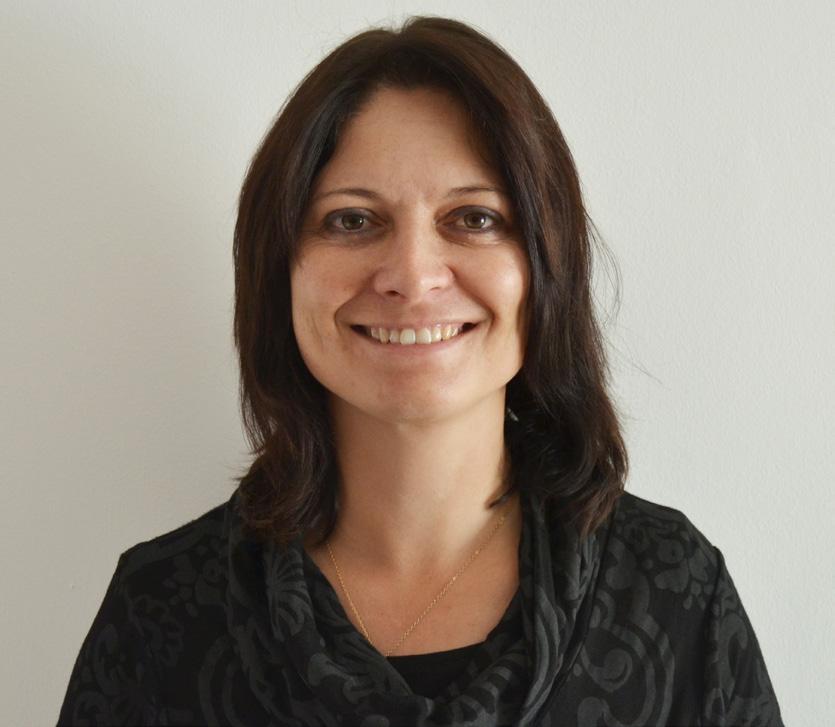
Notice was given to members of the veterinary profession to nominate veterinarians/specialists to fill a vacant position on the Council for its remaining term of office (2022 to 2025), due to the resignation of a councillor.
Three nominations were received, and voting commenced on 9 September 2024 and closed on 23 September 2024. The process was managed by EasyVote, and the results were submitted to the minister and published in the Government Gazette. We are pleased to announce that Dr Jana Pretorius has been elected to Council. We thank those of you who took the time to vote.
Council terms occur in three-year cycles. Every three years, nominations are invited, and elections are held for 10 veterinarians/ specialists in addition to one position for each of the five para-veterinary professions (animal health technician, laboratory animal technologist, veterinary physiotherapist, veterinary technologist and veterinary nurse).
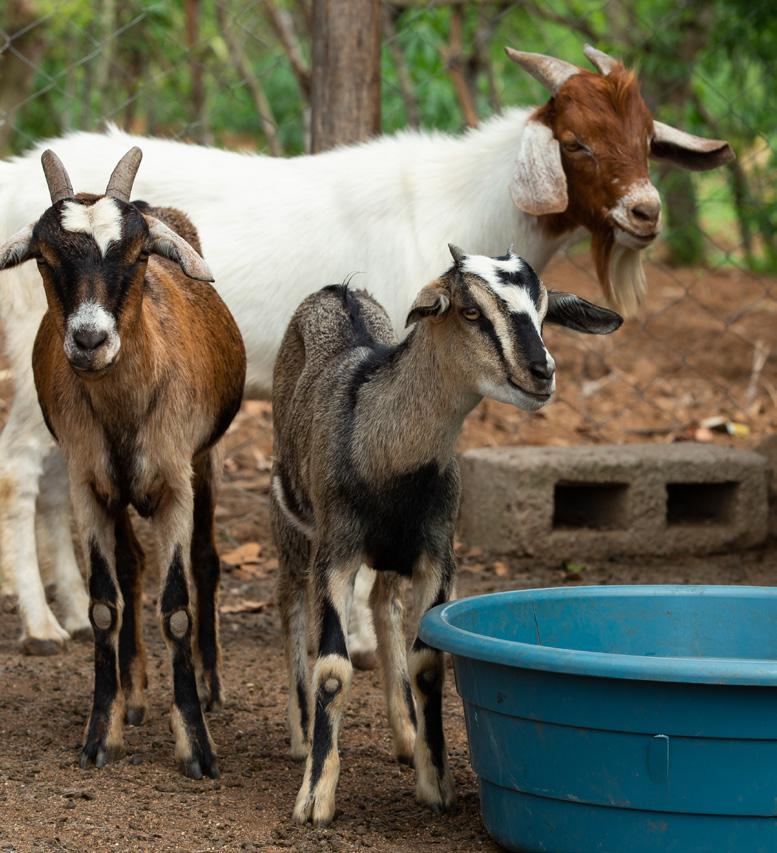
The Minister of Agriculture appoints six out of the 10 veterinarians/ specialists nominated and voted for, as well as the five elected paraveterinary professionals, to the Council. Thereafter, designated appointments are made for a further four veterinarians; one officer from the Department of Agriculture, Land Reform and Rural Development; one person on account of their knowledge of the law; and one nonveterinarian. The Rector of the University of Pretoria nominates one person to the Council, and the South African Veterinary Association (SAVA) nominates another. Collectively, this constitutes the new 20-member Council.
The election process for the next Council term (2025 to 2028) will commence in early 2025, with nominations and online voting expected to conclude by the end of the first quarter of 2025. If only one nomination is received for a position, that nominee will be automatically elected.
Look for the election notification via email to ensure your profession’s voice is heard and your preferred candidate is nominated.
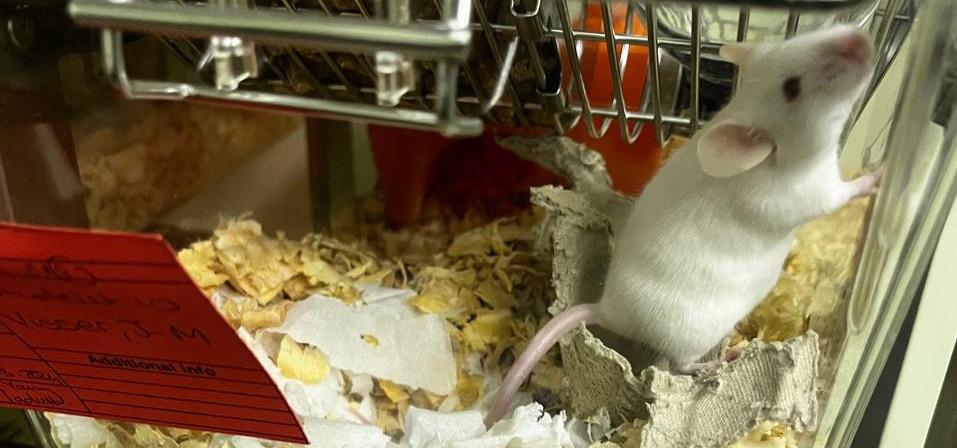
In a pioneering move that will dramatically increase the number of registered laboratory animal technologists (LATs), the Council offered the first registration examination for laboratory animal technologists on 26 and 27 March 2024 (theory) and from 14 to 16 August 2024 (practical) at the University of Pretoria’s Faculty of Veterinary Science in Onderstepoort.
Ten candidates successfully completed the online IAT level 2 and 3 courses.
The need for examinations arose after deficiencies in training for local conditions were identified. These were addressed through short learning programmes offered by Unisa in Jurisprudence, Pharmacology and Work Integrated Learning.
Ten candidates met all the requirements and then sat, and successfully completed, the Council’s registration examination. The practical examination covered various species: mice, rats, guinea pigs and sheep. The successful candidates will now be registered as LATs, increasing the number of qualified workers registered for this highly technical para-veterinary profession.
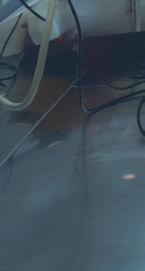


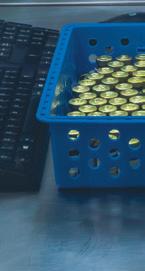
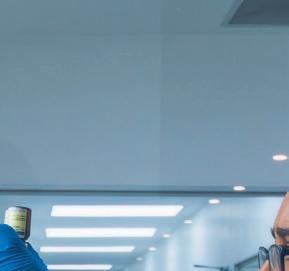
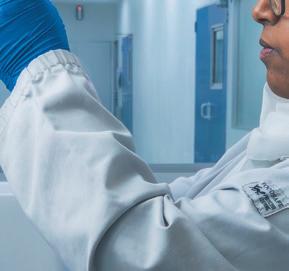
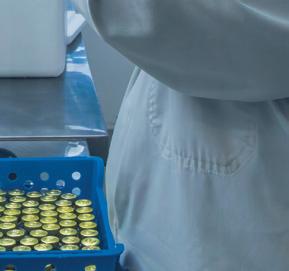
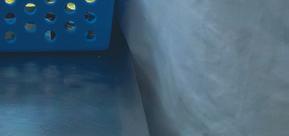

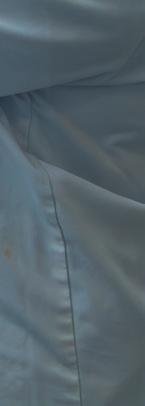
Professor Vinny Naidoo, Dean of the Faculty of Veterinary Science at the University of Pretoria, pays tribute to his late colleague.
I still have trouble coming to terms with the fact that Thiresh is not going to be around any more, and that I won’t get to have one of our many chats or discuss ideology. Thiresh and I were friends for close to 30 years, and she was also very good friends with my late wife.
Thinking back to 1996, when I went to Medunsa to start with the veterinary programme, she was literally the first person I met. As a fellow veterinary student, she completely understood why one would want to be a vet in a medical school – and this commonality started a great friendship.
Even then, while still a student, it was clear that she was different from the rest of us. She was community oriented and very strong in her beliefs. I can still remember getting the odd lecture from her on how, even as a veterinary student, making an impact should already be important to us and that community service is what we should strive for.
We continued on another journey when the Medunsa veterinary school was closed and amalgamated with the University of Pretoria (UP). But being Thireshni, she enjoyed every moment and probably ended up getting the best clinical exposure of any Medunsa graduate. With her being one year ahead of me, our paths diverged, but we soon found ourselves reunited on our own specialist journeys, me in clinical pharmacology and her in equine medicine.
I actually still remember the first day she came back to UP and related an amusing account of her first few hours on the job, while mimicking everything that happened. Now, Thiresh always looked younger than she really was and could easily pass as a first-year student. According to her, just as she got into the hospital she was called to an emergency. As she was completely new to the hospital, none of the students knew who she was.
So here was this young doctor running to save a colicky horse. As she was putting in the drip line, one of the young nursing
students tapped her on the shoulder and said, looking panicked, “I don’t think you should be doing this … you must wait for the doctor.” In typical fashion, she went on to save the horse – and then introduced herself as their new lecturer.
During her time at UP, she continued her passion for equality in the profession, especially for women and black veterinarians. Once, we all went down to Bloemfontein to establish the Black Veterinary Forum, following an idea she and Dr Alfred Kgasi (who went on to become SAVC President) had to bring black veterinarians together. This typified her attitude in life and how she not only knew what she wanted but, more importantly, also made it happen.
Although she left the university in 2009, we kept in touch, and I always respected her for her knowledge of equine medicine. She was the first person I approached to read my vision when I decided to join the deanery at the faculty, to get her ideas on my presentation. I got to return the favour when she applied for a lecturing position at the University of Surrey, motivating why she was most deserving of the position … which was not hard.
Thiresh, in your passing we have lost a truly talented veterinarian, a passionate person who was very clear about her ideals for the veterinary profession and the country. What’s more important is that through your efforts you took us on a journey to achieve these goals, and I think we can stand proud of what you’ve done for us. It was a real privilege to be your friend, work with you and call you a colleague.
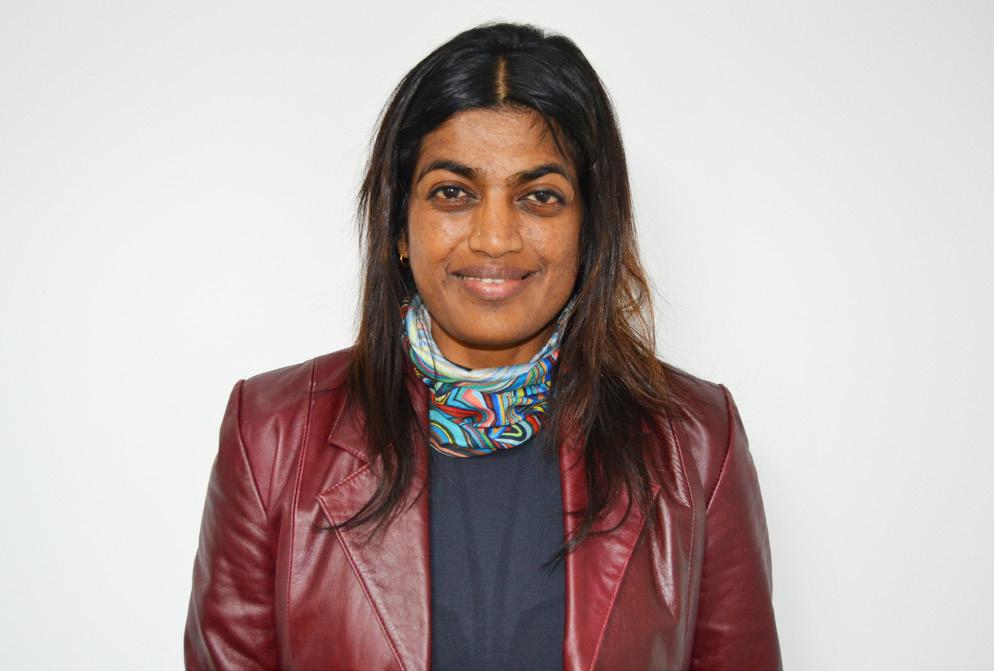
NOTICE IN TERMS OF SECTION 33(3) (bA) OF THE Veterinary and Para-Veterinary Professions Act 19 of 1982
The following person has been found guilty of unprofessional conduct by the South African Veterinary Council, after due inquiry into their conduct in terms of the rules relating to the veterinary and para-veterinary professions (as published in the Government Gazette):
1. Contravention of Rule 4(3)(a) by conducting himself in a dishonest and unethical manner in that between 1 March 2022 and 31 July 2022, and while under contract of employment, he carried out veterinary work on behalf of the employer but invoiced the service to his private account and received payment of R3 055.60 into his personal bank account on 22 April 2022, thereby appropriating resources and/or revenue belonging to the employer.
2. Contravention of Rule 4(3)(a) by conducting himself in a dishonest and unethical manner in that between 1 March 2022 and 31 July 2022 and while under contract of employment, he carried out veterinary work on behalf of the employer but invoiced the service to his private account and received payment of R1 718.34 into his personal bank account on 23 April 2022, thereby appropriating resources and/or revenue belonging to the employer.
3. Contravention of Rule 4(3)(a) in that he conducted himself in a dishonest and unethical manner in that between the period 1 March 2022 and 31 July 2022 and while under contract of employment, he carried out veterinary work on behalf of the employer and/or performed surgery on a patient but
Registration is suspended for three years, the operation of which is wholly suspended for five years on the following conditions:
That Dr Van As is not found guilty of a similar offence within the period of five years.
i. That he repays the employer the last month’s salary as tendered and agreed to.
ii. That he attends a CPDaccredited ethics course.
He is ordered to pay the costs of the hearing in terms of section 33(9) of the Act.
28/11/2023
Name of person Transgression
invoiced the service to his private account and received payment of R1 758.75 into his personal bank account on 31 May 2022, thereby appropriating resources and/or revenue belonging to the employer.
4. Contravention of Rule 4(3)(a) by conducting himself in a dishonest and unethical manner in that between 1 March 2022 and 31 July 2022 and while under contract of employment, he carried out a castration on behalf of the employer but invoiced the service to his private account and received payments of R3 850.34 and R2 538.73 into his personal bank account on 1 July 2022 and 4 July 2022 respectively, thereby appropriating resources and revenue belonging to the employer.
5. Contravention of Rule 4(3)(a) by conducting himself in a dishonest and unethical manner in that on or about 2 July 2022 and while under contract of employment, he consulted with a patient on behalf of the employer but invoiced the service to his private account and received payment of R1 782.60 into his personal bank account on 5 July 2022, thereby appropriating resources and revenue belonging to the employer.
6. Contravention of Rule 4(3)(a) by conducting himself in a dishonest and unethical manner in that between 18 and 19 July 2022 and while under contract of employment, he consulted and used the hospital’s X-ray machine but invoiced the service to his private account, thereby appropriating resources belonging to the employer.
Name of person Transgression
7. Contravention of Rule 4(3)(a) by conducting himself in a dishonest and unethical manner in that between 1 March 2022 and 31 July 2022 and while under contract of employment, he carried out veterinary work on behalf of the employer but invoiced the service to his private account and received payment of R2 482.47 into his personal bank account on 18 July 2022, thereby appropriating resources and revenue belonging to the employer.
8. Contravention of Rule 4(3)(a) by conducting himself in a dishonest and unethical manner in that between 1 March 2022 and 31 July 2022 and while under contract of employment, he carried out veterinary work on behalf of the employer but invoiced the services to his private account and received payment of R2 757.11 and R2 281.75 into his personal bank account on 18 July and 21 July 2022 respectively, thereby appropriating resources and revenue belonging to the employer.
9. Contravention of Rule 4(3)(a) by conducting himself in a dishonest and unethical manner in that between 1 March 2022 and 31 July 2022 and while under contract of employment, he carried out veterinary work on behalf of the employer but invoiced the service to his private account and received payment of R2 454.42 into his personal bank account on 11 July 2022, thereby appropriating resources and revenue belonging to the employer.
10. Contravention of Rule 4(3)(a) by conducting himself in a dishonest and unethical manner in that between 1 March 2022 and 31 July 2022 and while
Name of person
Transgression
Penalty imposed Date convicted
under contract of employment, he carried out veterinary work on behalf of the employer but invoiced the services to his private account and received payment of R3 887.75 into his personal bank account on 11 July 2022, thereby appropriating resources and revenue belonging to the employer.
11. Contravention of Rule 4(3)(e)(vi) read with Rule 1(xxiv) in that by providing veterinary services and/or issuing invoices and/or receiving payment for veterinary services in his private or personal capacity and/or for his private or personal account, he purported to practise the veterinary profession for his own account from an unknown facility that is not registered with the Council.
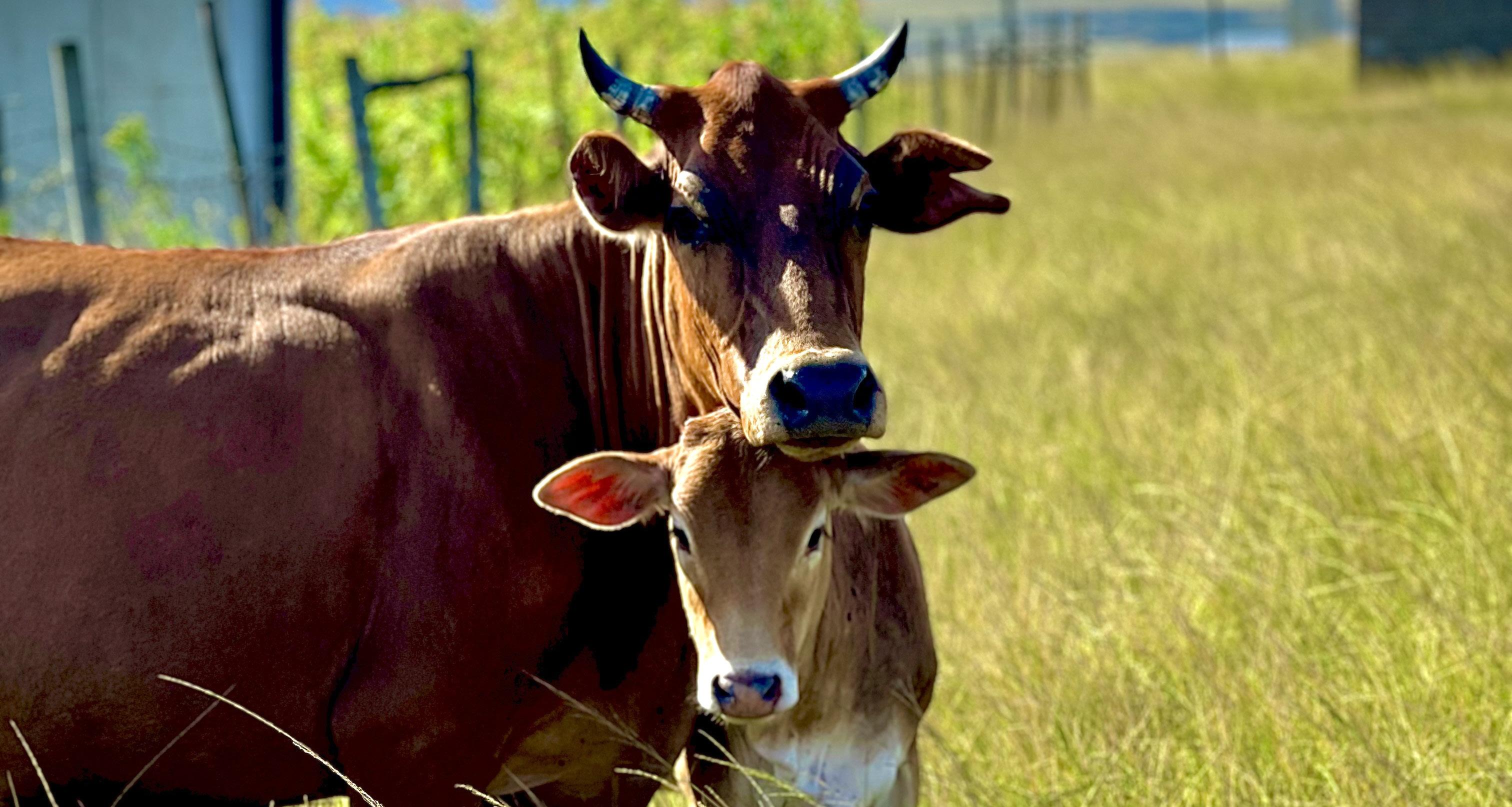

This is the second in a six-part article series on psychological well-being in the veterinary and para-veterinary professions. Future articles will address emotion awareness and emotional labour; working with loss and grief; and trauma and stress management.
By Retha Watson (MA: Industrial Psychology)
With permission from: www.vet360.co.za
One of the most debilitating concepts that social media and some motivational speakers have tried to sell us is that we have to be in a constant state of happiness – and that everything we do in life must have meaning and purpose. This may be something to aim for, but sometimes life is just tough. Sometimes we are worried, angry or just numb, and it is okay to experience different emotions and with varying intensity.
What we should strive for is the normalising of negative emotions: to name them, acknowledge them and have a healthy way of processing them.
We should be talking openly about mental illness and the negative impact it has on our work and home life; we need to create a safe space for ourselves and others to talk about mental illness.
We still have preconceived notions about mental illness. We would not tell a person with cancer that they should just find positive meaning in life – to keep busy and “get over it”. The same should apply to mental health issues. And just as there are specific medical interventions for cancer, there are also specific interventions and treatments for mental illness.
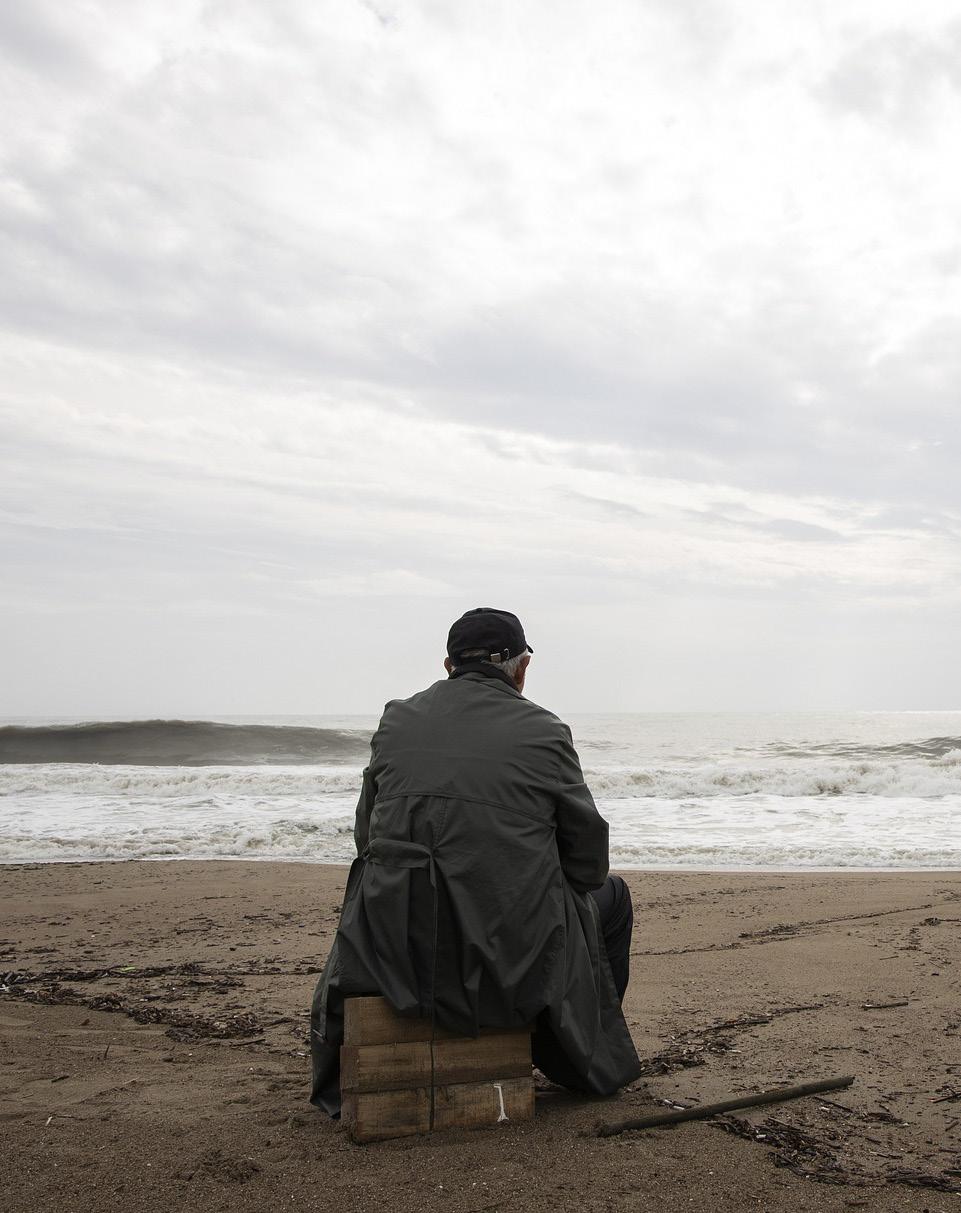
What a momentous day it would be if you could walk into the workplace and say, “I have been diagnosed with depression so I will be out of sorts more often than not”; or, from your boss, a sincere: “Amanda, I know you have been diagnosed with anxiety, so when things get too much, do what you need to do so that you can get well and healthy again. We will support you all the way, and we are here for you to talk to if you need us.”
Best, et al. (2020) wrote, “Veterinarian mental health is a reported area of concern in several countries worldwide, with high levels of anxiety and depression and self-reported burnout and compassion fatigue.”
"I wanted to talk about it. Damn it. I wanted to scream. I wanted to yell. I wanted to shout about it. But all I could do was whisper, ‘I am fine.’
– Unknown
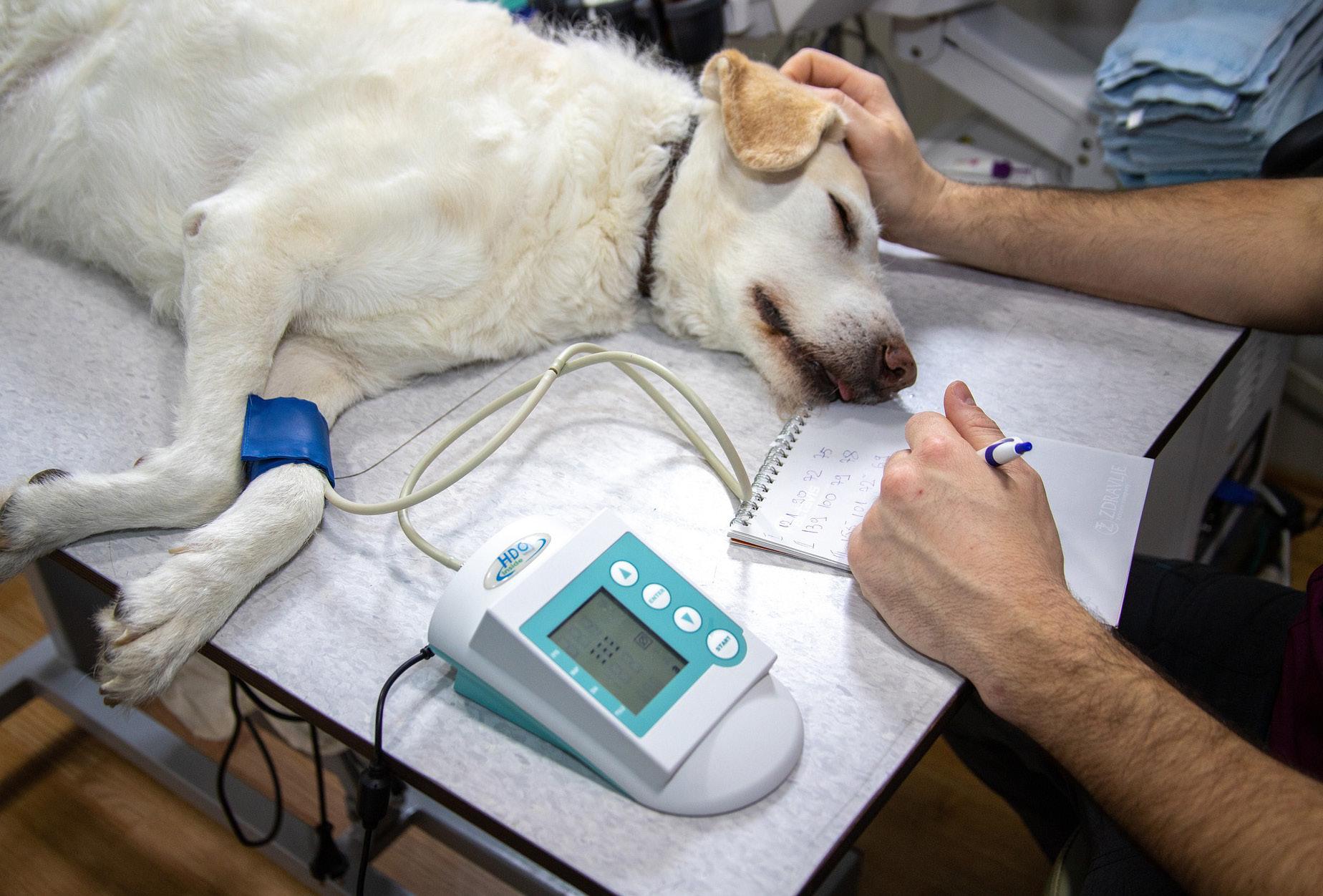
Anxiety
Everybody is anxious from time to time: writing exams, undertaking a difficult surgery or driving in a dangerous area. Anxiety, however, becomes a disorder or causes dysfunction when it is intense and extreme, and results in a continual worry about everyday situations in such a manner that it interferes with normal life, social interactions and relationships.
Risk factors for anxiety include medical conditions or previous traumatic experiences (perhaps even a traumatic experience as an infant), stress due to illness or a long-term stress build-up.
Individuals with high cognitive ability lean towards anxiety as one of their personality traits. Genetics and other psychological illnesses, as well as drug or alcohol misuse, may also lead to anxiety disorders.
Depression
As with anxiety, having a depressive phase – feeling down or sad – is normal. Short-duration depression can occur during an illness, after a traumatic event or as part of the grieving process. We may even experience mood changes from time to time.
Clinical depression is caused by a medical condition, or by an event so stressful or traumatic that it causes abnormalities in the neurotransmitters dopamine and serotonin. Depression may even be caused by specific medications or a genetic predisposition. Alcohol and drug abuse may also be a major cause of depression, or can exacerbate an underlying predisposition.
In 60% of cases, we find depression and anxiety existing in a comorbid and complex relationship – with the symptoms often overlapping.
Within the working environment of the veterinary industry, along with possible depression and anxiety, veterinary and para-veterinary professionals are also confronted with traumatic incidents, euthanasia and animal neglect and abuse. This means that it is quite common that compassion fatigue and burnout will also be present.
Professionals who work in an environment where they are exposed to other people’s trauma daily are exceptionally vulnerable to compassion fatigue. Acute symptoms may lead to physical and psychological illness.
Empathy is a valuable character trait in the medical professions, but it means opening oneself up to witnessing the pain, sorrow and trauma of others. Inevitably, this will lead to vicarious traumatisation, making the professional vulnerable to compassion fatigue – the total exhaustion of one’s physical and psychological being.
The causes may vary, and the condition is aggravated when professionals deny themselves self-care, volunteering for additional shifts and not taking their days off. Compassion fatigue can occur after a single trauma, or following years of accumulated exposure to extreme emotions and traumatic events.
Veterinary and para-veterinary professionals are by nature passionately involved in ensuring the well-being of their patients, and enough is never enough. This is how people in these particular professions become vulnerable to compassion fatigue.
The “Superman” syndrome – trying to save the world and be everything to everybody – is quite unachievable, and your mental and physical health may suffer as a result.
The saying “I would rather burn out than fade away” is a well-known phrase, said by many who have given themselves passionately for their cause – tragically, Nirvana frontman Kurt Cobain wrote these very same words in his suicide note.
Burnout is a state of psychological and physical exhaustion caused by extended and intense stress, and is mostly related to work. Where compassion fatigue is due to witnessing the trauma and emotions of others, burnout is caused by your own stress and exposure to traumatic incidents.
With depression, anxiety, compassion fatigue and burnout, symptoms may appear to be quite similar. Let’s have a look at the symptoms and how they overlap.
Specific symptoms
Depression
• Thoughts of death and suicide
• Constant sadness
• Slowed movement and speech
• Constant physical pain
Anxiety
• Sense of impending danger or doom
• Hyperventilation
• Sweating
• Trembling
• Avoidance of situations that may trigger anxiety
• Excessive worry
• Racing thoughts
Compassion fatigue
Burnout
• Headaches
Corresponding/overlapping symptoms
• Lack of interest and enjoyment
• Extreme fatigue
• Digestive/gastrointestinal problems
• Appetite and weight changes
• Inability to concentrate
• Inability to make decisions
• Impaired rational thinking and problem-solving ability
• Sleeping pattern changes: either too much sleep or too little (insomnia)
• Restlessness
• Irritability
• Difficulties with personal relationships
• Self-contempt, feelings of guilt
• Emotional disconnection
• Decreased sense of purpose
• Numbness
• Nervous restlessness
If you recognise any of the above symptoms, consult a medical doctor to rule out any underlying physical illness and then, if necessary, get a referral to a psychiatrist for consultation and appropriate medication.
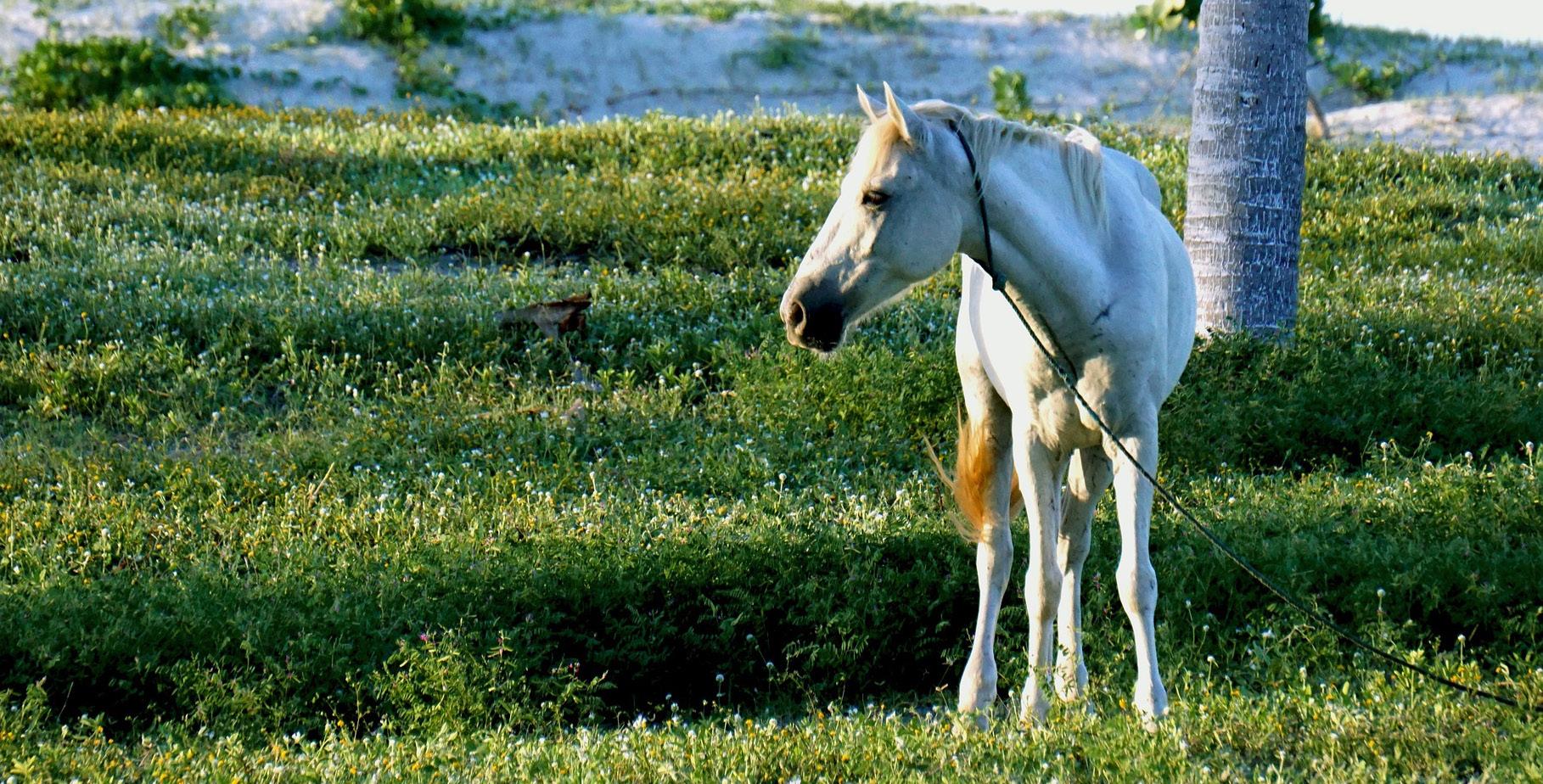
If we are in a goal-oriented space, it is easy to set objectives for our physical well-being. However, we should prioritise our psychological well-being as well.
• Take your days off, take your annual leave, and REST. During your leave, take on mindless projects that do not cause stress, such as relaxing with a puzzle or a good book, or perhaps renovating an old piece of furniture
• Exercise – endorphins are released during exercise that enhance your sense of well-being
• Follow a healthy diet – avoid sugar and caffeine. Research the concept of gut health; we have more serotonin in our stomach than in our brain, and that is the neurotransmitter we so desperately need for feeling mentally well
• Practise good sleep hygiene:
• Be consistent with your sleep time, ideally going to bed at least two hours before midnight and getting eight hours of uninterrupted sleep
• Keep your bedroom quiet, dark and relaxing, and at a comfortable temperature
• Remove all electronics from your room, such as smartphones, laptops and other devices
• Avoid large meals, caffeine and alcohol before bedtime
• Gentle exercise before bedtime will enhance your sleep
• Switch off any heating devices, as your body temperature needs to drop in order to go into a deep sleep
• Practise relaxation activities – any activity where you consciously relax, such as yoga, meditation, exploring nature and being wilfully present in the experience or listening to relaxing music
• Socialise with undemanding friends and family whose company is good for the body and soul
• Avoid the excessive use of alcohol and mood-altering drugs
• Practise gratitude and mindfulness
• Set small and attainable goals and objectives
• Give yourself a spoil day once every now and then – go for a massage, take a road trip, watch a movie you have wanted to see for ages, or read the book you never have time for
• Psychic numbing – dial down on your empathy when you are at work, so you can free up your cognitive resources and find solutions to problems rather than being overwhelmed with the emotions and pain of others
• Last, but definitely not least – if you feel that things are becoming too much to cope with, get professional help. While therapy and counselling do not aim to solve your problems, they offer you a process of facilitating your own understanding and healing within a safe environment

– Anne Lamott " "
Almost everything will work again if you unplug it for a few minutes, including you.
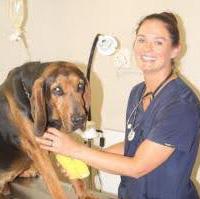
This year, the South African Police Service (SAPS) observed Women’s Month by highlighting the work of its women in blue –including those in veterinary practice.
Meet Captain Mariaan Nel, a qualified veterinary nurse attached to the SAPS Veterinary Services in Bloemfontein, Free State. Veterinary Services is a specialised unit that resides within the Visible Policing and Operations structure.
Captain Nel joined the service 13 years ago as a veterinary nurse shortly after obtaining a diploma in veterinary nursing from the University of Pretoria. She also holds a degree in accounting.
She is one of five female veterinary nurses in the service and is currently the only nurse based in the Free State as part of a pilot project. In total, there are eight veterinary nurses in the SAPS nationwide.
As a veterinary nurse in the SAPS, Captain Nel’s duties include the following:
• Delivering primary healthcare support to SAPS animals
• Monitoring the primary health status of SAPS animals and reporting on epidemiological phenomena
• Conducting veterinary inspections at SAPS K9 and Mounted units
• Presenting veterinary and animal handling courses to SAPS members
Captain Nel travels vast distances across the Free State to ensure the welfare of 37 dogs and nine horses attached to the various K9 and Mounted units in the province.
Police dogs and horses enhance police visibility and are deployed during crime prevention operations. They assist with investigations at crime scenes, tracing suspects, detecting narcotics and search-and-rescue operations.
Captain Nel says her profession may not place her at the forefront of fighting crime, but it gives her satisfaction to ensure the SAPS’s four-legged crime-fighting heroes stay in tip-top shape.
“I am passionate about the well-being of animals, in particular SAPS animals. I encourage girls and young women to pursue a career in the police, as it is rewarding to know your services make a valuable contribution towards a safer country for all,” she says. – article courtesy of SAnews.gov.za
The lion’s share: celebrating our professionals
Profession
Date
Laboratory Animal Technologist Day Thursday, 1 February 2024 (annually on 1 February)
Veterinary Technologist Day Tuesday, 23 April 2024 (annually on 23 April)
World Veterinary Day Saturday, 27 April 2024 (last Saturday of April)
World Suicide Prevention 10 September 2024 (annually 10 September)
Animal Health Technician Day Sunday, 15 September 2024 (annually on 15 September)
World Rabies Day Saturday, 28 September 2024 (annually on 28 September)
World Animal Welfare Day Friday, 4 October 2024 (annually on 4 October)
World Mental Day 10 October 2024 (Annually 10 October)
Veterinary Nurse Day Friday, 11 October 2024 (second Friday of October)
World One Health Day Sunday, 3 November 2024 (annually on 3 November)
Veterinary Physiotherapist Day Monday, 4 November 2024 (annually 4 November)
World Antimicrobial Awareness week 18-24 November 2024 (annually 18-24 November)
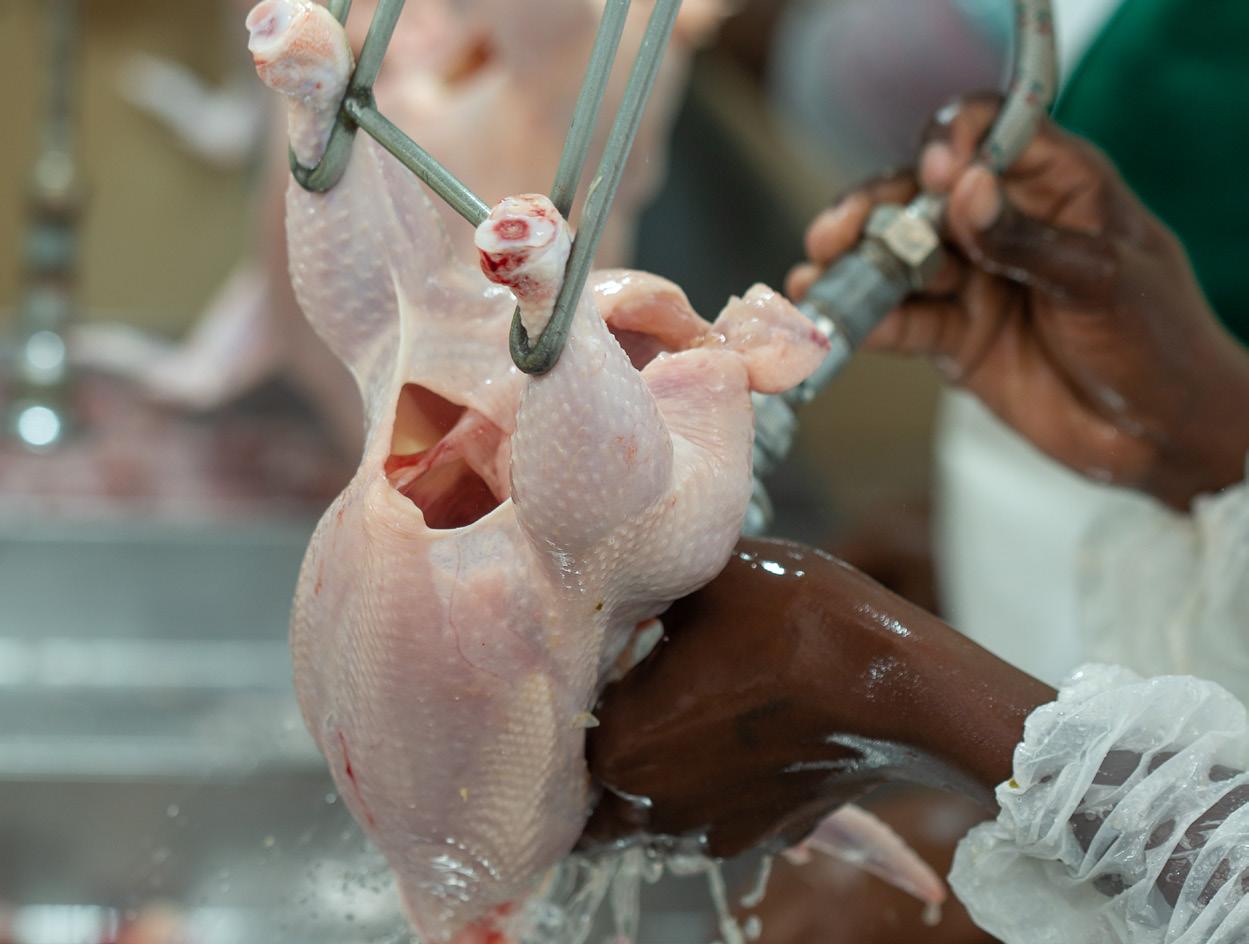
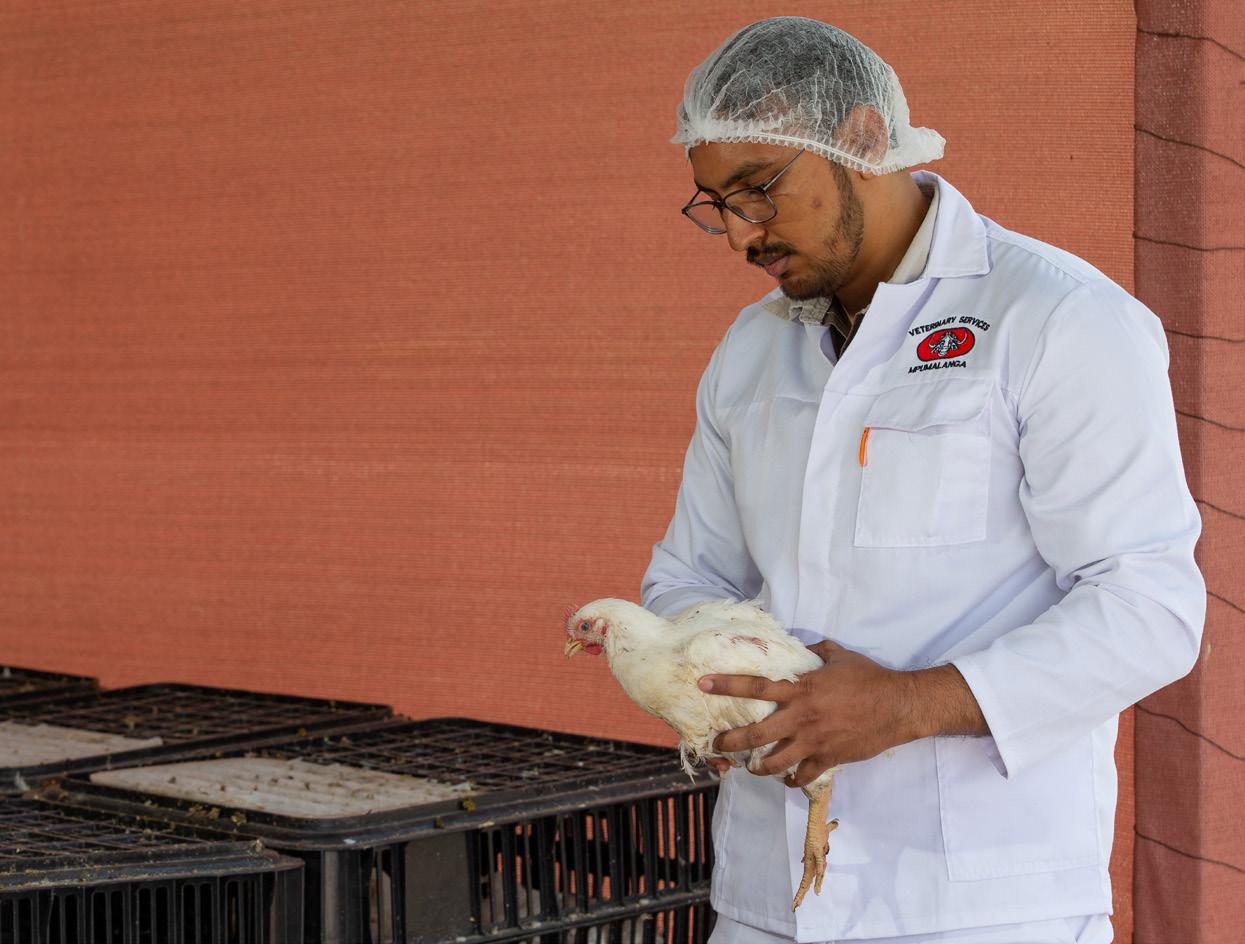

The global veterinary community rallied together to observe World Rabies Day on 28 September 2024, under the theme “Breaking Boundaries”.
As we all know, vaccination is the most effective way to protect ourselves and our pets against this deadly zoonotic disease. We need to get the word out that it’s possible to prevent rabies by vaccinating cats and dogs, especially in high-risk areas.
Signs of rabies include:
• Excessive salivation
• Paralysis
• Inability to swallow
• Continuous vocalisation
• Convulsions
• Aggression
• Non-responsive behaviour
Let’s educate our communities to help us promote responsible pet care among South Africans. Keep spreading the message that vaccination saves lives!
More information and downloadable resources: Global Alliance for Rabies Control website
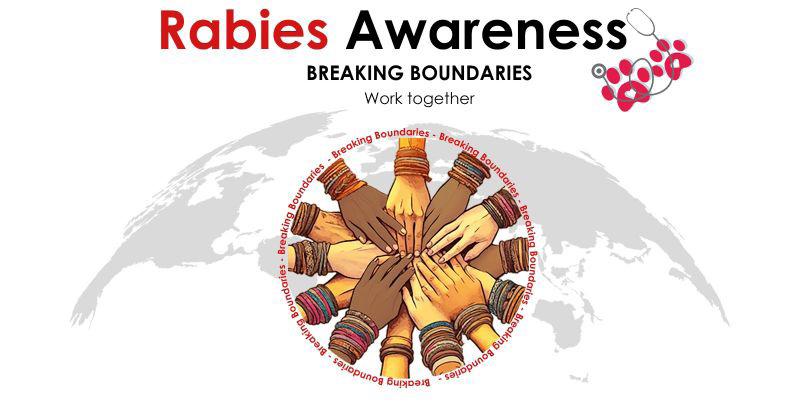
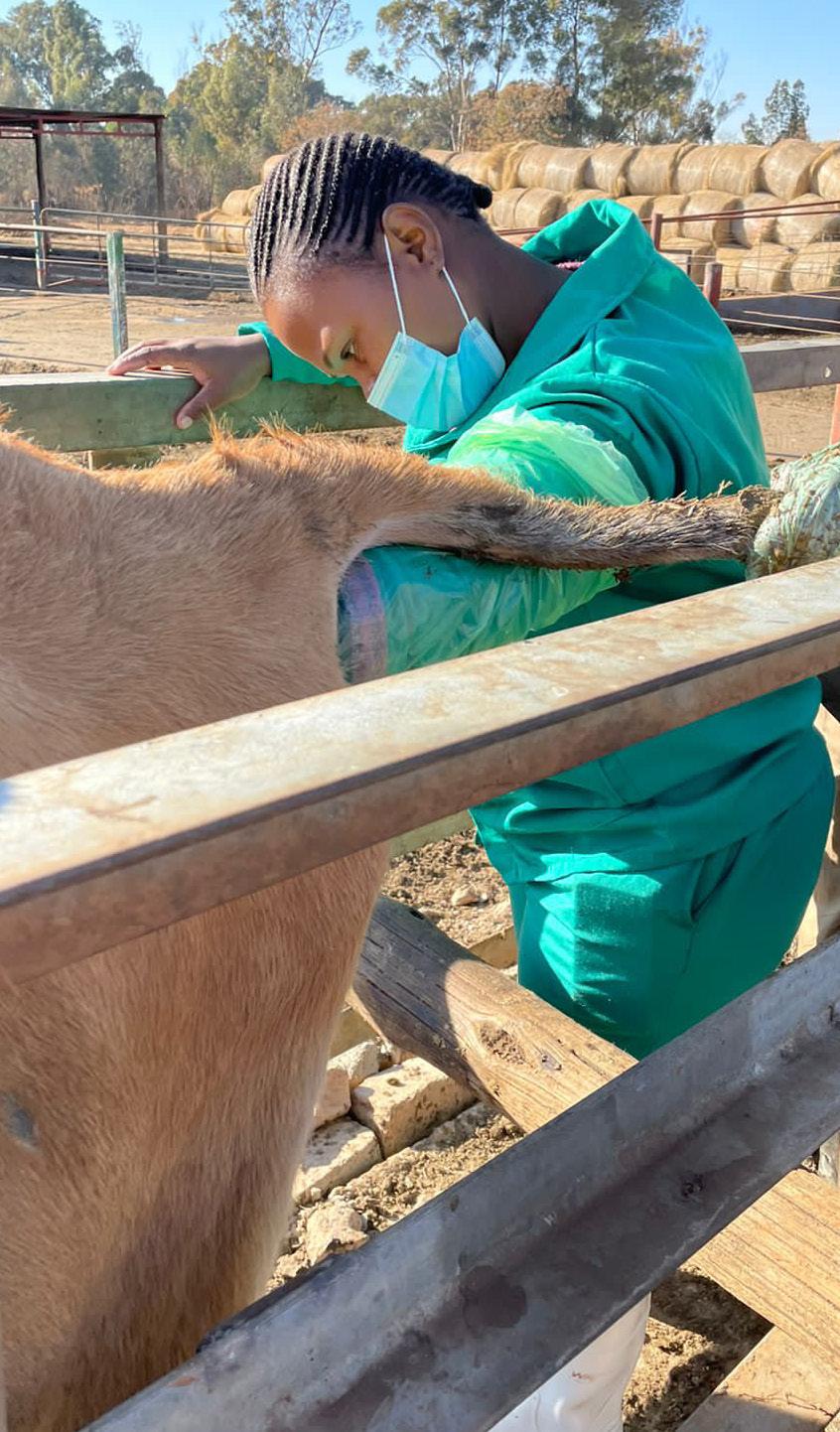

On Sunday, 15 September 2024, we paused to appreciate our incredible cohort of animal health technicians (AHTs) on AHT Day.
AHTs are a vital link in the animal healthcare chain, helping to promote healthy pets, livestock, poultry and animal products.
They render an important primary healthcare service by performing essential tasks such as vaccinating animals, administering stock remedies, collecting specimens for testing and inspecting abattoirs. This helps prevent disease and ensures biosecurity in our food chain.
Want to know more about AHTs? Watch our video in honour of AHT Day
We celebrated Veterinary Nurse Day on Friday, 11 October 2024, recognising our veterinary nurses for all they do to ensure our animals receive life-saving and life-enhancing care.
Veterinary nurses are involved in the hands-on care of animals, dispensing and administering medicine, attending to wounds and injuries, administering vaccinations, taking samples and assisting veterinarians during procedures.
By nature, a vet nurse is caring, compassionate, dedicated and nurturing, not to mention highly skilled. We appreciate your devotion to your profession –keep up the amazing work!
To find out more about what being a vet nurse entails, watch our video in honour of Veterinary Nurse Day https://youtu.be/yKFsYhWBD9A
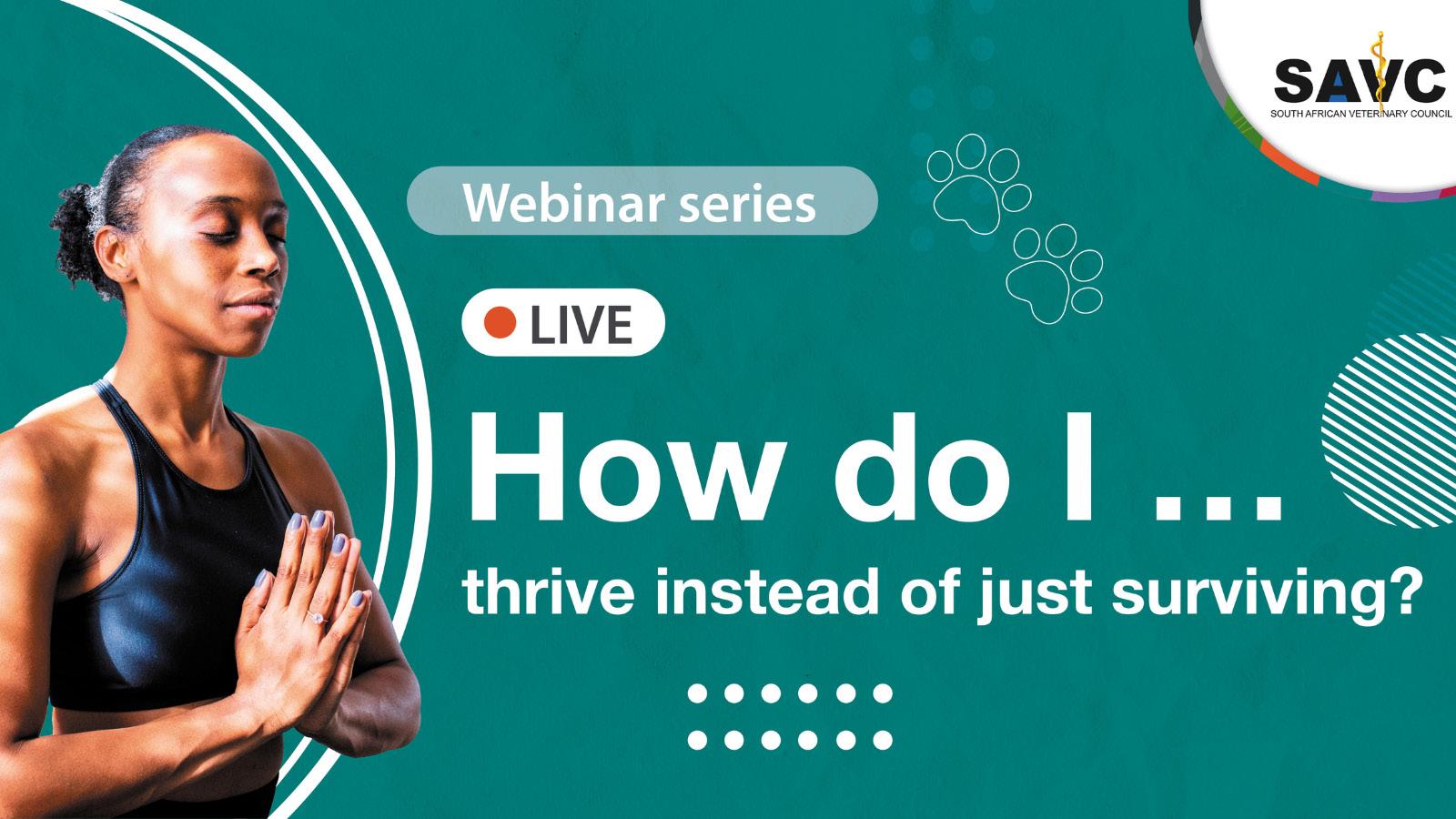
Thank you to everyone who attended our recent “How do I … thrive instead of just surviving?” webinar on Building Your Resilience: Master the Art of Bouncing Forward.
The webinar, which featured a talk by psychologist Dr Monica van Niekerk, offered our professionals practical tools and strategies for overcoming adversity.
This webinar, held on 30 September 2024, attracted 131 attendees. If you missed it or would like to replay it, you can watch this valuable knowledge-sharing session at https://savclive.co.za/
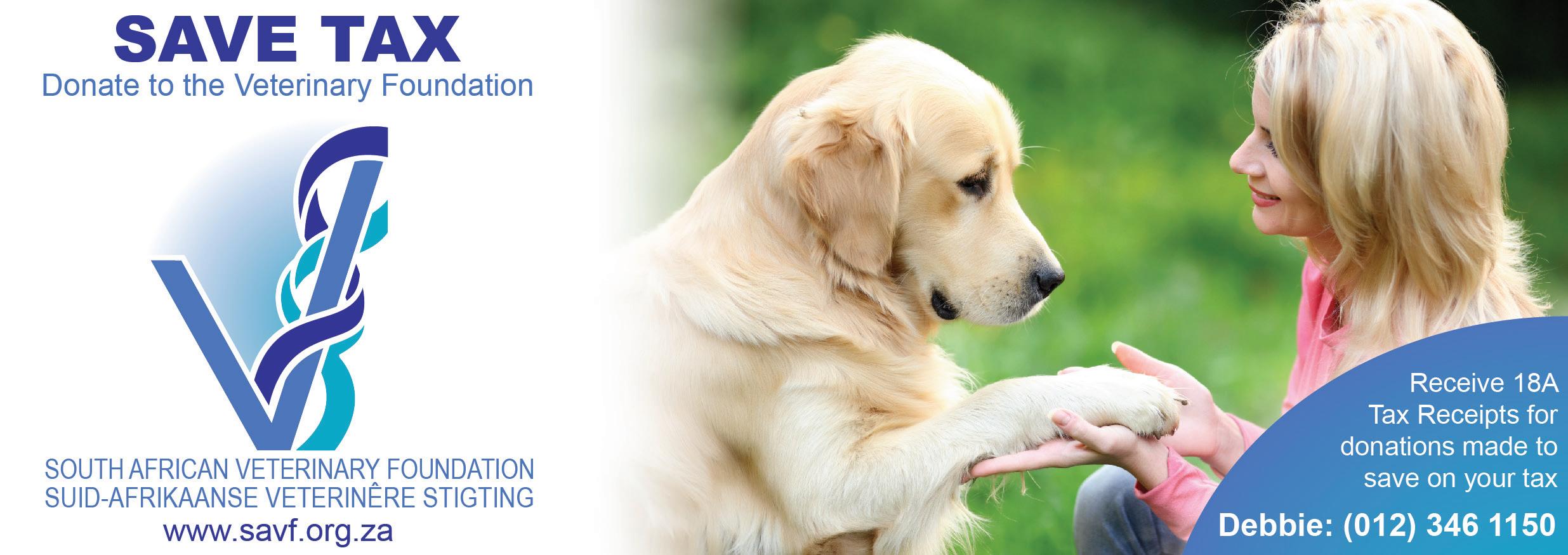

Please follow our social media pages to keep up to date with news and developments in South Africa’s veterinary and para-veterinary professions, as well as the job vacancies received by the SAVC for advertising purposes.
We’d love to interact with you!
Facebook: https://www.facebook.com/SAVCPretoria LinkedIn: https://www.linkedin.com/company/savc-south-africanveterinary-council/
The lion’s share: celebrating our professionals
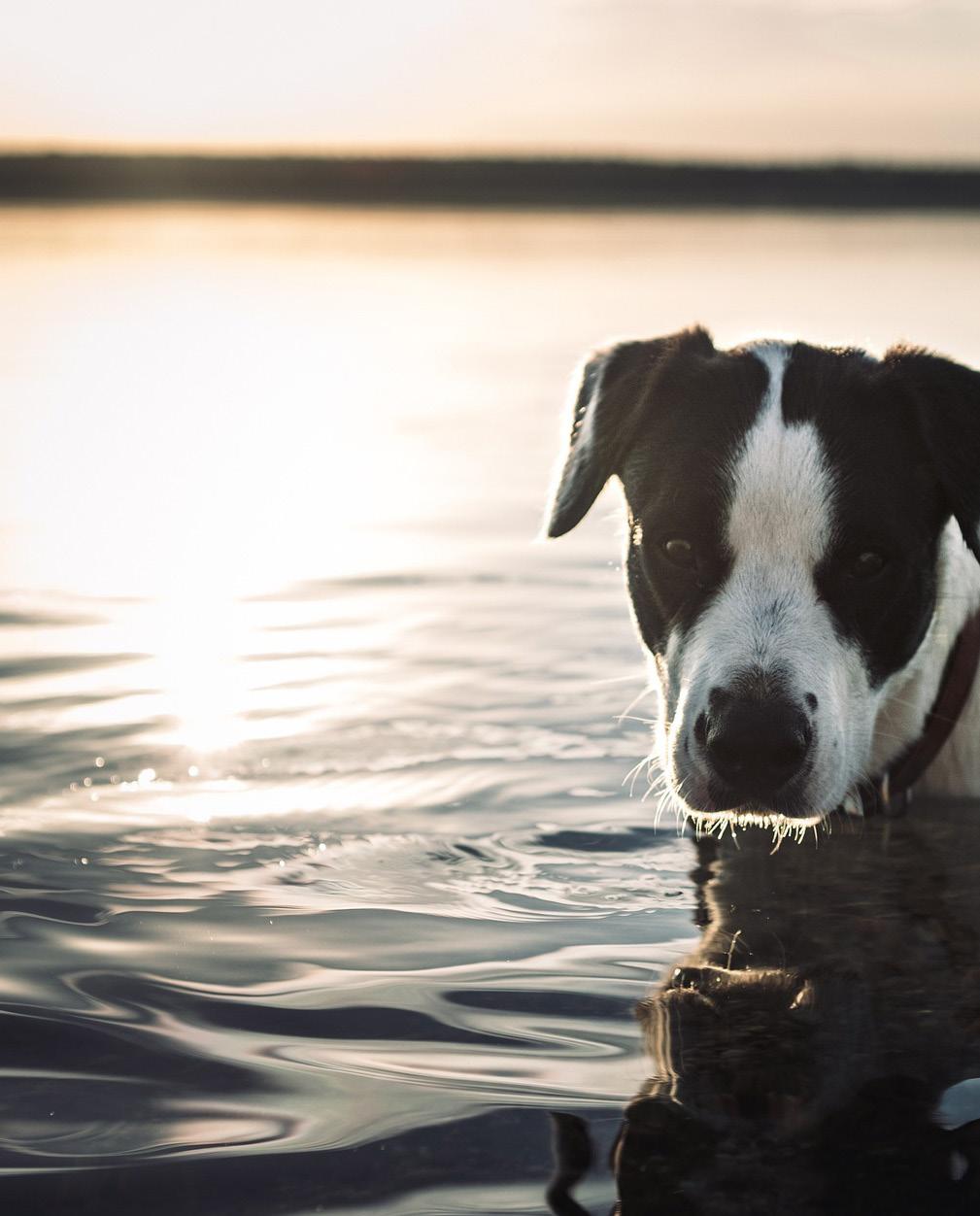
The SAVC is saddened by the passing of these registrees. We wish their loved ones and colleagues ccomfort and healing:
• Dr Gilbert Theo Hinze
• Dr Christopher Russell Palmer
• Dr Thireshni Chetty
• Dr Walter Manfred Herbert Löwe
• Dr Leslie Walter Marshall
• Dr Margaret Anne Hiza
• Dr Alain John Carter
We salute and honour you for serving our professions with such dedication.
Need to get in touch? Please consult the infographic below to find the correct person at the SAVC to contact for your specific query.
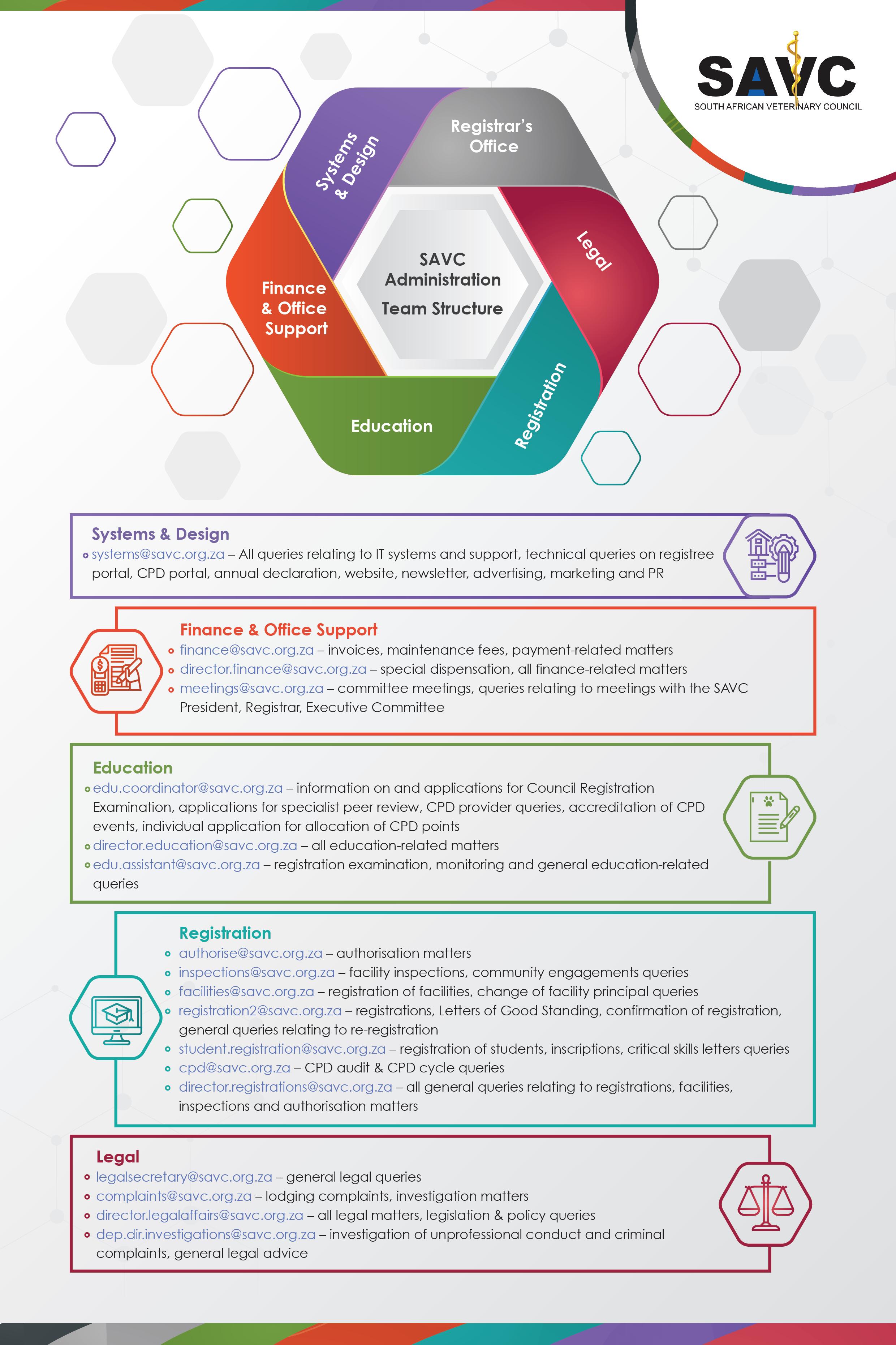
The purpose of the SAVC’s Wellness Committee is to improve the Council’s role in supporting members of the veterinary and paraveterinary professions, as well as students and those attached to training institutions. We undertake that our registrees’ details will be kept confidential at all times.
The SAVC is exploring different avenues to provide wellness services to its registrees and staff members. Updates will be communicated in due course.
As the process is still ongoing, in the interim we encourage anyone experiencing mental health challenges such as anxiety or depression to contact the South African Depression and Anxiety Group (SADAG). SADAG offers free and confidential online support.
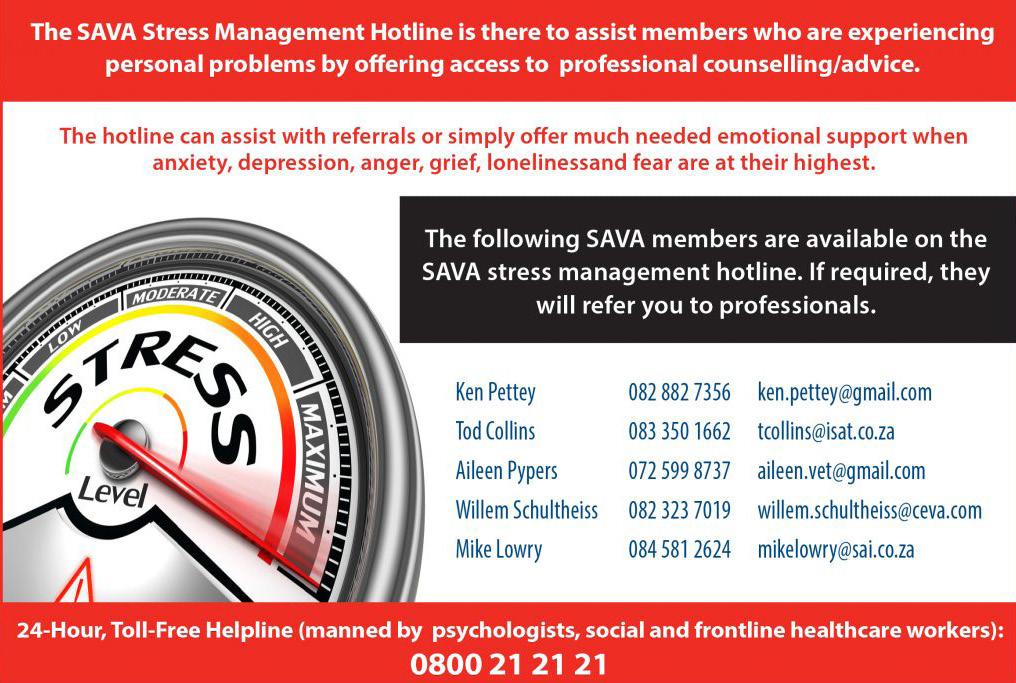
The South African Veterinary Association (SAVA) also has a stress management hotline: The SAVA Stress Management Hotline
The SAVC Wellness Committee encourages all veterinarians and para-veterinary professionals to contact SADAG or the SAVA hotline if they experience any form of mental distress.
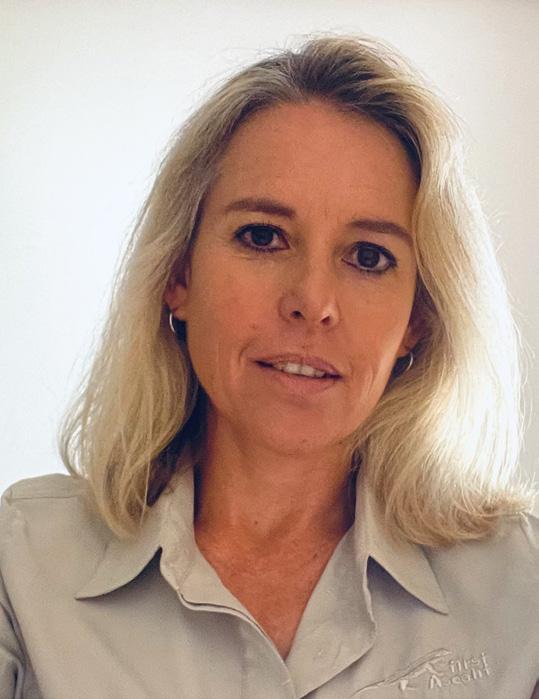
Wellness Committee
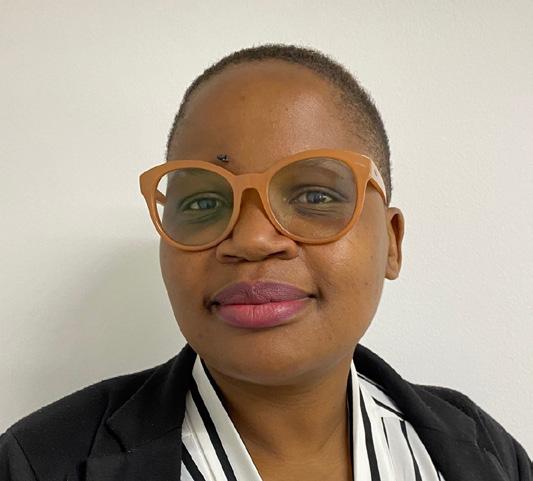
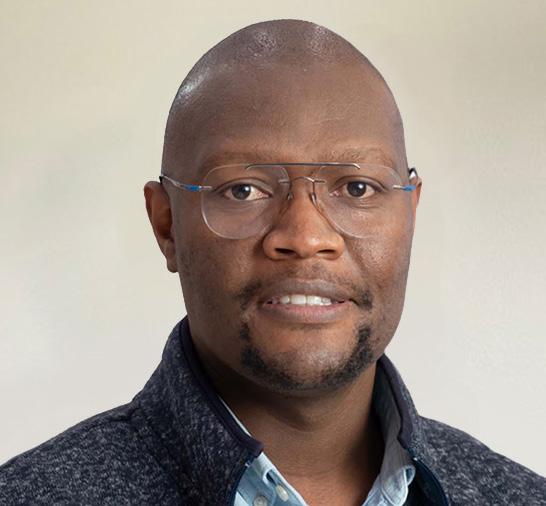
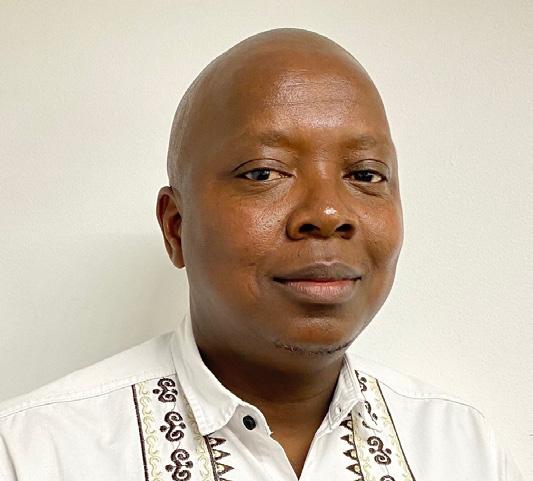
For any queries, please send an email to Chester Magardie at hr@savc.org.za.
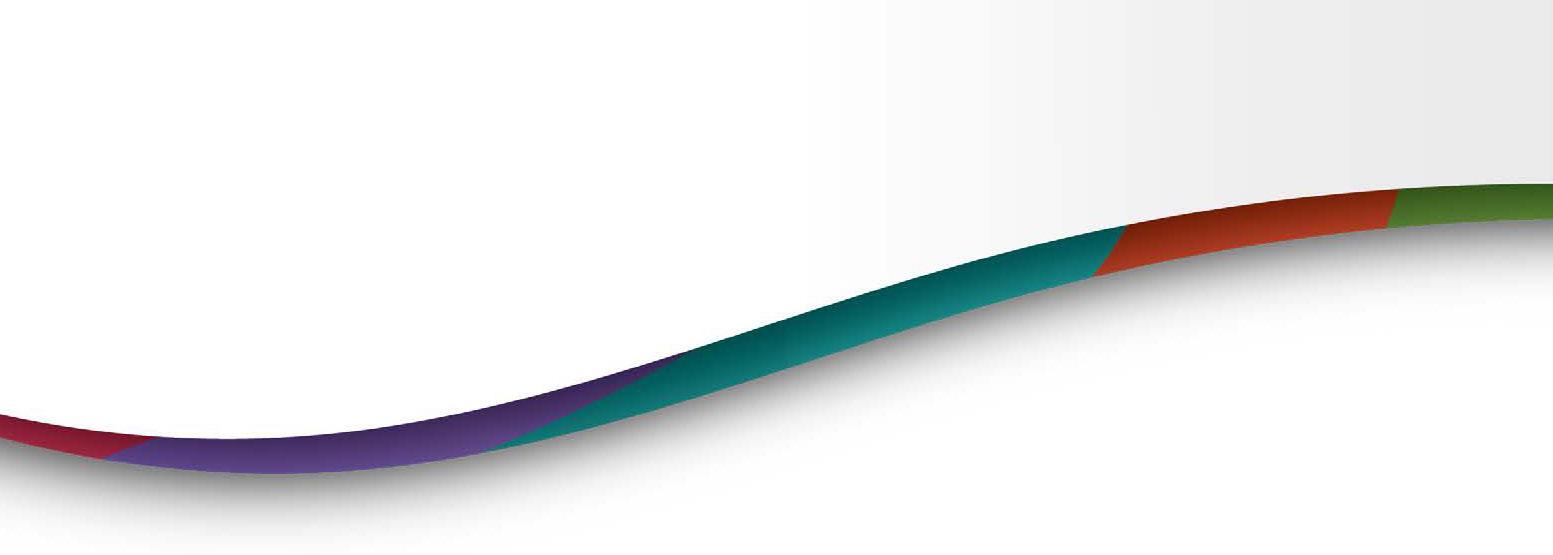
The SAVC protects the interests of those dependent on animals by:
Safeguarding the health and welfare of all animals and the environment
Assuring veterinary public health
Regulating the educational, ethical and clinical standards of the veterinary and para-veterinary professions
The South African Veterinary Council (SAVC) shall not be liable for any loss due to advertisements published in its newsletters. The advertisements represent the products of the advertisers only. The SAVC does not accept liability for the information or advice contained in the advertisements or for any loss arising from the use of the products advertised. By placing the advertisements, the SAVC in no way endorses the product or content of the advertisement.
www.savc.org.za
26 Victoria Link Street, Route 21 Corporate Park, Nellmapius Drive, Irene, Gauteng, South Africa
Tel: 0027 (0)12 345 6360 Fax: 0027 (0)12 345 6369
